#it was directed by steven spielberg i think
Text
one thing about me is i will watch movies knowing absolutely nothing. who's in it? no idea. did the trailer look good? didn't watch it. what's the genre? you're guess is as good as mine.
#its just so fun#like i never no what to expect and then its just fun#dont know anything about glass onion but im excited to watch it#watched the talented mr ripley adn was completely shocked by what was going on#all i knew was taht matt damon was in it#watched a movie about a truck following this guy on the road once#that was fun#it was directed by steven spielberg i think#anywhos#movies#films
1 note
·
View note
Text
Okay, since the Spielberg post blew up, I need to clear up something because I can see in the notes that pple think that Spielberg owns the rights to MLK speeches and I don't want to spread any misinformation. This is what the Vice article says:
In 2009, Steven Spielberg's DreamWorks company paid the estate for film rights to King's words, along with his life rights, which allow a person or company to make content based on an individual's story. DreamWorks has yet to produce or direct Spielberg's planned King biopic, but the rights have caused complications for numerous filmmakers. (Neither Spielberg's literary agent nor King's estate returned Broadly's request for comment.)
This means that while the MLK estate still owns the original copyright for the speeches, Spielberg actually bought and now owns the film rights to MLK's speeches. However, this doesn't erase how problematic it it is since this means that Spielberg is the only filmmaker legally allowed to use MLK's speeches word for word in his films. A White filmmaker is essentially holding onto the film rights, at the expense of Black filmmakers. The article talks about how Ava Duvernay had to write original speeches from scratch for Selma.
King has received only one major biopic, 2014's Selma, directed by Ava DuVernay [...] Instead of using King's speeches, DuVernay wrote original monologues that sounded like soliloquies the civil rights leader could have given. [...] When asked about the changes in 2014, DuVernay told the Washington Post, "We knew those rights are already gone. They're with Spielberg."
The article also mentioned that Spielberg bought life rights and according to this Forbes article, this means that Spielberg also bought the rights to MLK's life.
By paying the Estate for the film rights to Dr. King's speeches along with life rights, Spielberg obtained unprecedented filmmaking access to Dr. King’s life — supported by Dr. King’s extraordinary intellectual property (the right to use Dr. King’s actual words.)
Hope this clarifies everything!
- mod sodapop
4K notes
·
View notes
Text
Steven Spielberg: Were there any actors on your film that you think would be directors? They were kind of like over your shoulder, wanting to see through the lens, really curious about how you were styling your shots?
Denis Villeneuve: The truth. There is one that spent a lot of time. There’s someone that spent a lot of time behind the camera…listening…listening… Zendaya.
Spielberg: Zendaya?
Villeneuve: Yeah. Yeah. Yeah. Yeah. She is so clever. She is brilliant and she is a strong presence. She was always on set even when she was not shooting. Just sitting between Greg and I…listening…listening…listening. So I would not be surprised that one day we learn that she wants to go behind the camera.
Spielberg (jokingly) : See if Zendaya is available to direct a 8 million dollar film … ok
youtube
129 notes
·
View notes
Text
Anonymous ask: What do you think of the new Indiana Jones movie? And of Phoebe Waller-Bridge?
In a nutshell: From start to finish ‘Indiana Jones and the Dial of Destiny’ is watching Indiana Jones being a broken-down shell of a once great legacy character who has to be saved by the perfect younger and snarky but stereotypical ’Strong Independent Woman’ that passes for women characters in popcorn movies today.
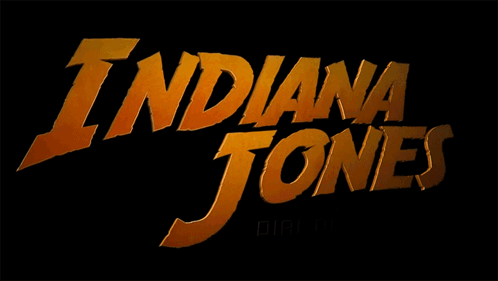
I went in to this film with conflicted feelings. On the one hand I was genuinely excited to see this new Indiana Jones movie because it’s Indiana Jones. Period. Yet, on the other hand I feared how badly Lucasfilm, under Kathleen Kennedy’s insipid woke inspired CEO studio direction, was going to further tarnish not just a screen legend but the legacy of both George Lucas and Steven Spielberg. The cultural damage she has done to such a beloved franchise as the Star Wars universe in the name of progressive woke ideology is criminal. The troubled production history behind this film and its massive $300 million budget (by some estimates) meant Disney had a lot riding on it, especially with the future of Kathleen Kennedy on the line too as she was hands on with this film.
To me the Indiana Jones movies (well, the first three anyway, the less we say about ‘Kingdom of the Crystal Skull’ the better) were an important part of my childhood. I fell in love with the character instantly. Watching ‘Raiders of the Lost Ark’ (first on DVD in my boarding school dorm with other giggly girls and later on the big screen at a local arts cinema retrospective on Harrison Ford’s stellar career) just blew me away.
As a girl I wanted to be an archaeologist and have high falutin’ adventures; I even volunteered in digs in Pakistan and India (the Indus civilisation) as well as museum work in China as a teen growing up in those countries and discovering the methodical and patient but back breaking reality of what archaeology really was. But that didn’t dampen my spirit. Just once I wanted to echo Dr. Jones, ‘This belongs in a museum!’ But I happily settled for studying Classics instead and enjoyed studying classical archaeology on the side.

I couldn’t quite make sense why Indiana Jones resonated with me more than any other action hero on the screen until much later in life. Looking like Harrison Ford certainly helps. But it’s more than that. I’ve written this elsewhere but it’s worth repeating here.
‘Raiders of the Lost Ark’ is considered an inspiration for so many action films yet there’s a very odd aspect to the film that’s rather unique and rarely noticed by its critics and fans. It’s an element that, once spotted, is difficult to forget, and is perhaps inspiring for times like the one in which we currently live, when there are so many challenges to get through. Typically in action films, the hero faces an array of obstacles and setbacks, but largely solves one problem after another, completes one quest after another, defeats one villain after another, and enjoys one victory after another.
The structure of ‘Raiders’ is different. A quick reminder:
- In the opening sequence, Indiana Jones obtains the temple idol only to lose it to his rival René Belloq (Paul Freeman).
- In the streets of Cairo, Indy fails to protect his love, Marion Ravenwood (Karen Allen), from being captured (killed, he assumes).
- In the desert, he finds the long-lost Ark of the Covenant, only to have it taken away by Belloq.
- Indy then recovers the ark only to have it stolen a second time by Belloq, this time at sea.
- On an island, Indy tries to bluff Belloq into thinking he’ll blow up the ark. His bluff fails. Indy is captured.
- The climax of the film literally has its hero tied to a post the entire time. He’s completely ineffectual and helpless at a point in the movie where every other action hero is having their greatest moment of struggle and, typically, triumph.
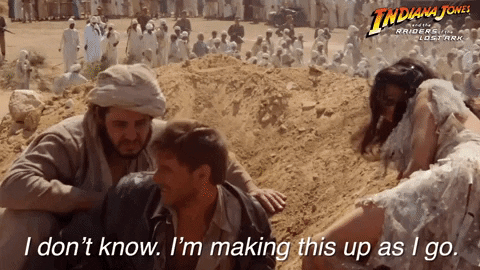
If Indiana Jones had done absolutely nothing, if the famed archeologist had simply stayed home, the Nazis would have met the same fate - losing their lives to ark’s wrath because they opened it. It’s pretty rare in action films for the evil arch-villains to have the same outcome as if the hero had done nothing at all.
Indy does succeed in getting the ark back to America, of course, which is crucial. But then Indy loses the ark, once again, when government agents send it to a warehouse and refuse to let him study the object he chased the whole film. In other words: Indiana Jones spends ‘Raiders’ failing, getting beat up, and losing every artefact that he risks his life to acquire. And yet, Indiana Jones is considered a great hero.
The reason Indiana Jones is a hero isn’t because he wins. It’s because he never stops trying. I think this is the core of Indiana Jones’ character.
Critics will go on about something called agency as in being active or pro-active. But agency can be reactive and still be kinetic to propel the story along. It’s something that has progressively got lost as the series went on. With the latest Indiana Jones film I felt that Indiana Jones character had no agency and ends up being a relatively passive character. Sadly Indiana Jones ends up being a grouchy, broken, and beat up passenger in his own movie.
Released in 1981, ‘Raiders of the Lost Ark’ remains one of the most influential blockbusters of all time. Exciting action, exotic adventure, just the right amount of romance, good-natured humour, cutting-edge special effects: it was all there, perfectly balanced. Since then, attempts have been made to reproduce this winning recipe in different narrative contexts, sometimes successfully (’Temple of Doom’ and ‘the Last Crusade’), usually in vain (’Crystal Skull’).
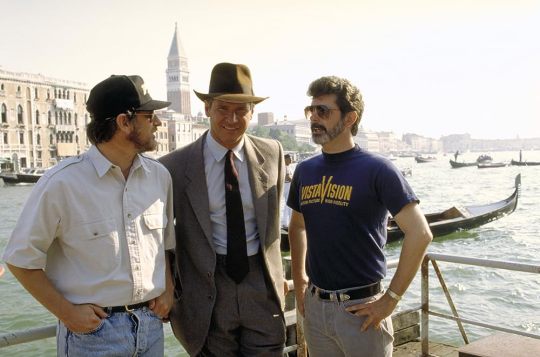
What are the key ingredients of an Indiana Jones movie? There are only four core elements - leaving aside aspects of story such as the villain or the goal - that you need in place before anything else. They are: the wry, world-weary but sexy masculine performance of Harrison Ford; the story telling genius of George Lucas steeped in the lore of Saturday morning action hero television shows of the 1950s; the deft visual story telling and old school action direction of Steven Spielberg; and the sublime and sweeping music of the great John Williams. This what made the first three films really work.
In the latest Indiana Jones film, you only have one. Neither Lucas and Spielberg are there and arguably neither is Harrison Ford. John Williams’ music score remains imperious as ever. His music does a lot of heavy lifting in the film and let’s face it, his sublime music can polish any turd.
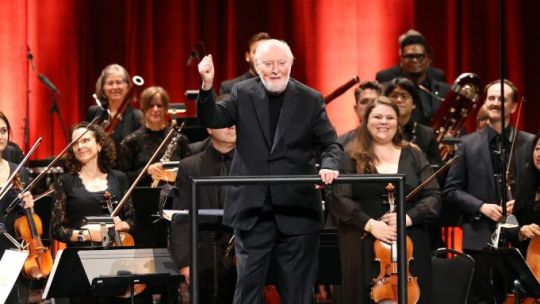
This isn’t to say the ‘Dial of Destiny’ is a turd. I won’t go that far, and to be honest some of the critical reaction has been over-hysterical. Instead I found it enjoyable but also immensely frustrating more than anything else. It had potential to be a great swan song film for Indy because it had an exciting collection of talent behind it.
In the absence of Spielberg, one couldn’t do worse than to pick James Mangold as next best to direct this film. Mangold is a great director. I am a fan of his body of work. After ‘Copland’, ‘Walk the Line’, ‘Logan’ and ‘Le Mans 66’ (or ‘Ford vs Ferrari’), James Mangold has been putting together a fine career shaped by his ability to deliver stories that rediscover a certain old-fashioned charm without abusing the historical figures - real or fictional - he tackles. And after Johnny Cash, Wolverine and Ken Miles, among others, I had high hopes he would keep the flame alive when it came to Indiana Jones. Mangold grew up as a fanboy of Spielberg’s work and you can clearly see that in his approach to directing film.
But in this film his direction lacks vitality. Mangold, while regularly really good, drags his feet a little here because he’s caught between putting his own stamp on the film and yet also lovingly pay homage to his hero, Spielberg. It’s as if he didn't dare give himself away completely, the director seems too modest to really take the saga by the scruff of the neck, and inevitably ends up suffering from the inevitable comparison with Steven Spielberg.
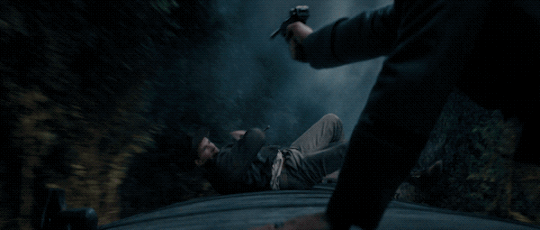
Mangold tries to recreate the nostalgic wonder of the originals, but doesn't quite succeed, while succumbing to an overkill of visual effects that make several passages seem artificial. The action set pieces range from pedestrian to barely satisfying. The prologue sequence was vaguely reminiscent of past films but it was still a little too reliant on CGI. The much talked about de-ageing of Harrison Ford on screen was impressive (and one suspects a lot of the film budget was sunk right there). But Indiana’s lifeless digitally de-aged avatar fighting on a computer-generated train, made the whole sequence feel like the Nazi Polar Express. Because it didn’t look real, there was no sense of danger and therefore no emotional investment from the audience. You know Tom Cruise would have done it for real and it would have looked properly cinematic and spectacular.
The tuk tuk chase through the narrow streets of Tangiers was again an exciting echo of past films, especially ‘Raiders’, but goes on a tad too long, but the exploration of the ship wreck (and a criminally underused cameo by Antonio Banderas) was disappointing and way too short.
The main problem here is the lack of creativity in the conception of truly epic scenes, because these are not dependent on Ford's age. Indeed, the film could very well have offered exhilarating action sequences worthy of the archaeologist with the whip, without relying solely on the physicality of its leading man. You don't need a Tom Cruise to orchestrate great moments but you could do worse than to follow his example.
Mangold uses various means of locomotion to move the character - train, tuk tuk, motorbike, horse - and offers a few images that wouldn't necessarily be seen elsewhere (notably the shot of Jones riding a horse in the middle of the underground), but in the end shows himself to be rather uninspired, when the first three films in the saga conceived some of the most inventive sequences in the genre and left their mark on cinema history. There are no really long shots, no iconic compositions, no complex shots that last and enrich a sequence, which makes the film look too smooth and prevents it from giving heft to an adventure that absolutely needs it.

And so now to the divisive figure of Phoebe Waller-Bridge.
It’s important here to separate the person from the character. I like Phoebe Waller-Bridge and I loved her in her ‘Fleabag’ series. She excels in a very British setting. I think she is funny, irreverent, and a whip smart talented writer and performer. I also think she has a particular frigid English beauty and poise about her. When I say poise I don’t mean the elegant poise of a Parisienne or a Milanese woman, but someone who is cute and comfortable in her own skin. You would think she would be more suited to ‘Downton Abbey’ setting than all out Hollywood action film. But I think she almost pulls it off here.
In truth over the years Phoebe Waller-Bridge, known for her comedy, has been collecting franchises where she is able to inflict her saucy humour into a hyper-masculine space. I don’t think her talent was properly showcased here.
Hollywood has this talent for plucking talented writers and actors who are exceptional in what they do and then hire them do something entirely different by either miscasting them or making them write in a different genre. I think Phoebe Waller-Bridge is exceptional and she might just rise if she is served by a better script.
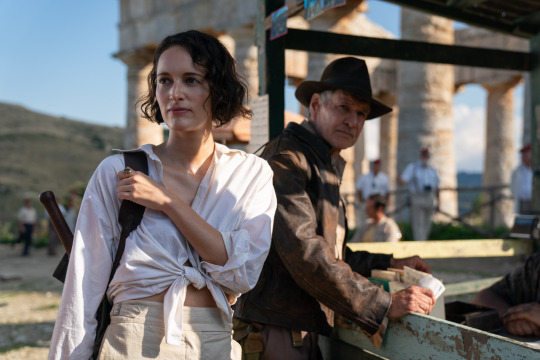
In the end I think she does a decent stab at playing an intriguing character in Helena Shaw, Indy’s long lost and estranged god daughter and a sort of amoral rare artefacts hustler. Phoebe Waller-Bridge brings enthusiasm, charm and mischief to the role, making her a breath of fresh air. She seems to be the only member of the on-screen cast that looks to be enjoying themselves.
To be fair her I thought Waller-Bridge was a more memorable and interesting female character than either Kate Capshaw (’Temple of Doom’, 1984) and Alison Doody (’Last Crusade’, 1989). She certainly is a marked improvement on the modern woke inspired insipid female action leads such as Brie Larson (’Captain Marvel’), or any women in the Marvel universe for that matter, or Katherine Waterson (’Alien Covenant’). Waller-Bridge could have been reminiscent of Kathleen Turner (’Romancing the Stone’) and more recently Eva Green, actresses who command attention on screen and are as captivating, if not more so, than the male protagonists they play opposite.
To be sure there have been strong female leads before the woke infested itself into Hollywood story telling but they never made it central to their identity. Sigourney Weaver in ‘Alien’ and Linda Hamilton in the ‘Terminator’ franchise somehow conveyed strength of character with grit and perseverance through their suffering, while also being vulnerable and confident to pull through and succeed. Phoebe Waller-Bridge’s character isn’t quite that. She doesn’t get into fist fights or overpowers big hulking men but she uses cheek and charm to wriggle out of tight spots. She’s gently bad ass rather the dull ‘strong independent woman’ cardboard caricatures that Marvel is determined to ram down every girl’s throat. If Waller-Bridge’s character was better written she might well have been able to revive memories of the great ladies of Hollywood's golden age who had the fantasy and the confidence that men quaked at their feet.
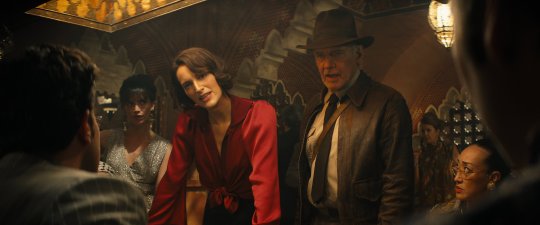
What lets her character down is the snark. She doesn’t pepper her snark but she drowns in it. All of it directed at poor Indy and mocking him for his creaking bones and his entire legacy. It’s a real eyesore and it is a real let down as it drags the story down and clogs up the wheels that power the kinetic energy that an adventure with Indiana Jones needs. ‘The grumpy old man and the young woman with the wicked repartee set off across the vast world’ schtick is all well and good, but it does grate and by the end it makes you angry that Indy has put up with this crap. I can understand why many are turned off by Waller-Bridge’s character. As a female friend of mine put it, we get the talented Phoebe Waller Bridge’s bitter and unlikable Helena acting like a bitter and unlikable man. But it could be worse, it could be as dumb as Shia LaBeouf‘s bad Fonzie impersonation in 'Crystal Skull’.
I would say there is a difference between snark and sass. Waller-Bridge’s character is all snark. If the original whispers are true the original script had her way more snarkier towards Indy until Ford threatened to leave the project unless there were re-writes, then it shows how far removed the producers and writers were from treating Indy Jones with the proper respect a beloved legacy character deserves. It’s also lazy story telling.
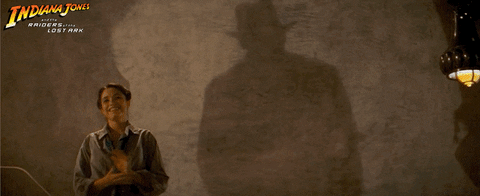
Karen Black gave us real sass with Marion Ravenwood in ‘Raiders’. Her character was sassy, strong, but also vulnerable and romantic. She plays it pitch perfect. Of all the women in Indy’s life she was good foil for Indy.
Spielberg is so underrated for his mise-en-scène. We first meet Marion running a ramshackle but rowdy tavern in Tibet (she’s a survivor). She plays and wins a drinking game (she’s a tough one), she sees Indy again and punches him (she’s angry and hurt for her abandoning her and thus revealing her vulnerability). She has the medallion and becomes a partner (she’s all business). She evades and fights off the Nazis and their goons, she even uses a frying pan (she’s resourceful but not stupid). She tries on dresses (she’s re-discovers her femininity). Indy saves her but she picks him up at the end of the film by going for a drink (she’s healing and there’s a chance of a new start for both of them). This is a character arc worth investing in because it speaks to truth and to our reality.
The problem with Phoebe Waller-Bridge’s character is that she is constantly full on with the snark. Indy and Helena gripe and moan at each other the entire film. Indy hasn’t seen her in years, and she felt abandoned after her father passed, so there’s a lot of bitterness. It’s not unwarranted, but it also isn’t entertaining. It’s never entertaining if the snark makes the character too temperamental and unsympathetic for the audience to be emotionally invested in her.
I think overall the film is let down by the script. Again this is a shame. The writing talent was there. Jez and John-Henry Butterworth worked with James Mangold on ‘Ford v. Ferrari’ and co-wrote ‘Edge of Tomorrow‘ while David Koepp co-wrote the first ‘Mission: Impossible’ (but he also penned Indiana Jones and the ‘Kingdom of the Crystal Skull’, and the 2017 version of ‘The Mummy’ that simultaneously started and destroyed Universal’s plans for their Dark Universe). I love the work of Jez Butterworth who is one of England’s finest modern playwrights and he seemed to have transitioned fine over to Hollywood. But as anyone knows a Hollywood script has always too many cooks in the kitchen. There are so many fingerprints of other people - studio execs and directors and even stars - that a modern Hollywood script somehow resembles a sort of Ship of Theseus. It’s the writer’s name on the script but it doesn’t always mean they wrote or re-wrote every word.
Inevitably things fall between the cracks and you end up filming from the hip and hoping you can stitch together a coherent narrative in post-production editing. Clearly this film suffered from studio interference and many re-writes. And it shows because there is no narrative fluidity at work in the film.

Mads Mikkelsen’s Nazi scientist is a case in point. I love Mikkelsen especially in his arthouse films but I understand why he takes the bucks for the Hollywood films too. But in this film he is phoning in his performance. Mads Mikkelsen does what he can with limited screen time to make an impact but this character feels so recycled from other blockbusters. Here the CIA and US Government are evil and willing to let innocent Americans be murdered in order to let their pet Nazi rocket scientist pursue what they believe to be a hobby. But to be fair the villains in the Indy movies have never truly been memorable with perhaps Belloq, the French archaeologist and nemesis of Indy in ‘Raiders’, the only real exception. It’s just been generic bad guys - The Nazis! The Thugee death cult! The Nazis (again)! The Commies! Now we’re back to Nazis again which is not only safer ground for the Indy franchise but something we can all get behind.
However Mads Mikkelsen’s Dr. Voller, is the blandest and most generic Nazi villain in movie history. At the end of World War II, Voller was recruited by the US Government to aid them in rocket technology. Now that he’s completed his task and man has walked on the moon, he’s turning his genius to his ultimate purpose, the recovery of the ‘Dial of Destiny’ built by Archimedes. Should he find both pieces of the ancient treasure, he plans to return to 1930s Nazi Germany, usurp Hitler, and use his advanced knowledge of rocket propulsion to win the war. In a sense then he was channeling his inner Heidegger who felt Hitler had let down Nazism and worse betrayed Heidegger himself.
So there is a character juxtaposition between Voller and Indy in the sense both men feel more comfortable in the past than the present. But neither is given face time together to explore this intriguing premise that could have anchored the whole narrative of the film. It’s a missed opportunity and instead becomes a failure of character and story telling.

Then there are the one liners which seemed shoe horned in to make the studio execs or the writers feel smug about themselves. There are several woke one lines peppered throughout the film but are either tone deaf or just stupid.
“You trigger happy cracker”- it’s uttered without any self-awareness by a black CIA agent who is chaperoning the Nazi villain. Just because white people think it’s dumb and aren’t bothered by it doesn’t make it any less a racial slur. If you want authenticity then why not use the ’N’ word then as it would historically appropriate in 1969? The hypocrisy is what’s offensive.
“You stole it. He stole it. I stole it. It’s called capitalism.” - capitalism 101 for economic illiterate social justice warriors.
“[I’m] daring, beautiful, and self-sufficient” - uttered by Helena Shaw as a snarky reminder that she’s a strong independent woman, just in case you forgot.
“It’s not what you believe but how hard you believe.” - Indiana Jones has literally stood before the awesome power of God when the Ark of the Covenant was opened up by the Nazis, and they paid the price for it by having their faces melted off. Indy has drunk from the authentic cup of Christ, given to him by a knight who’s lived for centuries, that gave him eternal life and heal his father from a fatal bullet wound. So he’s figuratively seen the face of God (sure, he closed his eyes) and His holy wrath, and has witnessed the divine healing power of Christ first hand. And yet his spews out this drivel. It’s empty of any meaning and is a silly nod to our current fad that it’s all about the truth of our feelings, not observable facts or truth.

For me though the absolute worse was what they did to Indiana Jones as a character. Once the pinnacle of masculinity, a brave and daring man’s man whose zest for life was only matched by his brilliance, Henry Jones Jr. is now a broken, sad, and lonely old man. Indiana Jones is mired in the past. Not in the archaeological past, but in his own personal past. He's asleep at the wheel, losing interest in his own life. He's lost his son, he's losing his wife. He's been trying to pass on his passion, his understanding to disinterested people. They're not so interested in looking at the past. He remains a man turned towards the past, and then he finds himself confronted by Helena, who embodies the future. This nostalgia, this historical anchoring, becomes the main thread of the story.The film tries to deconstructs Indiana Jones on the cusp of retirement from academia and confronts him with a world he no longer understands. That’s an interesting premise and could have made for a great film.
It’s clear that the filmmakers’ intention was for a lost and broken Indiana to recapture his spirit by the film’s end. However, its horrible pacing and meandering and underdeveloped plot, along with Harrison Ford’s miserably sad demeanour in nearly every scene, make for a deeply depressing movie with an empty and unearned resolution.
By this I mean at the very end of the film. It’s meant to be daring and it is. There’s something giddy about appearing during the middle of siege of Syracuse by blood thirsty Romans and then coming face to face with Archimedes himself. The film seems to want to justify the legendary, exceptional aura and character of Indy himself by including him in History. Hitherto wounded deep down inside, and now also physically wounded, Indy the archaeologist tells Helena that he wants to stay here and be part of history.
It's a lovely and even moving moment, and you wonder if the film isn't going to pull a ‘Dying Can Wait’ by having its hero die in order to strengthen its legend. But in a moment that is too brutal from a rhythmic point of view, Helena refuses, knocks out her godfather and takes him back to the waiting plane and back to 1969. The next thing Indy sees he’s woken up back in his shabby apartment in New York.
I felt cheated. I’m sure Indy did too.
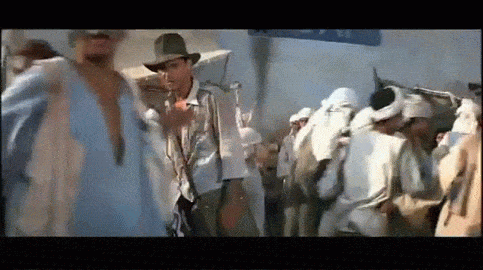
After all it was his choice. But Helena robbed him of the freedom to make his own decisions. She’s the one to decide what’s best. In effect she robbed him of agency. Even if it was the wrong decision to stay back in time, it’s so important from a narrative and character arc perspective that Indy should have had his own epiphany and make the choice to come back by himself because there is something worth living for in the future present - and that was reconciling with Marion his estranged wife. But damn it, he had to come to that decision for himself, and not have someone else force it upon him. That’s why the ending feelings so unearned and why the story falls flat as a soufflé when you piss on it.
‘Indiana Jones and the Dial of Destiny’ feels like the type of sequel that aimed to capture the magic of its predecessors, had worthwhile intentions, and a talented cast, but it just never properly materialised. In a movie whose pedigree, both in front and behind the camera, is virtually unassailable, it’s inexcusable that this team of filmmakers couldn’t achieve greater heights.
The film was a missed opportunity to give a proper send off to a cinematic legend. Harrison Ford proving that whatever gruff genre appeal he possessed in his heyday has aged better than Indy’s knees. He may be 80, but Ford carries the weight of the film, which, for all its gargantuan expense, feels a bit like those throwaway serials that first inspired Lucas - fun while it lasts, but wholly forgettable on exit.
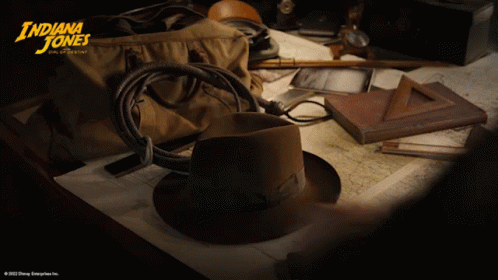
I wouldn’t rate ‘Indiana Jones and the Dial of Destiny’ as the worst film in the franchise - that dubious honour still lies with ‘Kingdom of the Crystal Skull’. Indeed the best I can say is that I would rate this film at the benchmark of “not quite as bad as Crystal Skull”.But it’s definitely time to retire and hang up the fedora and the bull whip.
For what’s worth I always thought the ending of ‘Last Crusade’ where Indy, his father Henry Jones Snr., and his two most faithful companions, Sallah and Marcus Brody, ride off into the sunset was the most fitting way to say goodbye to a beloved character.
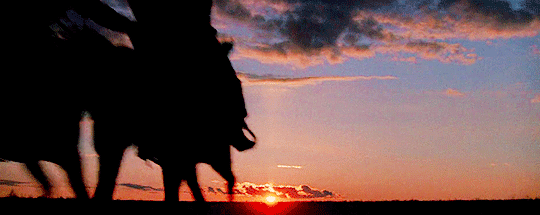
Instead we have in ‘Dial of Destiny’ the very last scene which is meant to be this perfect ending: Indiana Jones in his scruffy pyjamas and his shabby apartment. Sure, the exchange between a reconciling Indy and Marion is sincere and touching. But that only works because it explicitly recalls ‘Raiders of the Lost Ark’. That's what Nietzsche would call “an eternal return”.
I shall eternally return to watch the first three movies to delight in the adventures of the swashbuckling archaeologist with the fedora and a bull whip. The last two dire films will be thrown into the black abyss. Something even Nietzsche would have approved of.

Thanks for your question.
#ask#question#indiana jones the dial of destiny#dial of destiny#indiana jones#lucasfilm#harrison ford#phoebe waller bridge#james mangold#steven spielberg#george lucas#john williams#kathleen kennedy#disney#film#cinema#movies#arts#cancel culture#personal
112 notes
·
View notes
Text
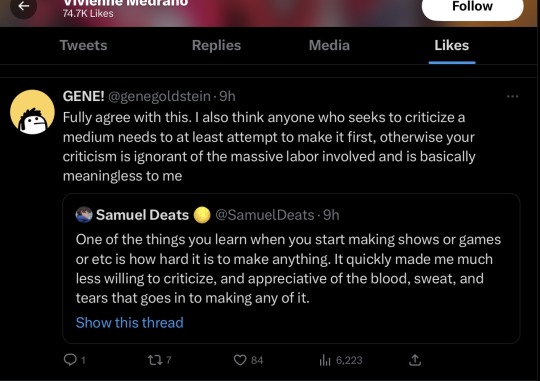
I will never not fucking hate this take with all my fiber being. The take of “In order to criticize media, you must make said media first on your own, otherwise your words are useless”, like how people have told me “You think you can do better? Go make your own show!”. Like….PLEASE shut the fuck up, whoever has this mindset needs to wake up and get their heads out of their entitled asses. The worst part is that that’s not the worst take here. The other one is the one I hate the most, the “You have to acknowledge and appreciate the HARD work that went into making this you don’t understand!”
I am so….fucking tired of this toxic ass outlook on how we have to suck up to said media and “appreciate” the hard work that went into it, as if that’s automatically going to make our critiques MAGICALLY go away. Like yeah, you made a movie, yeah, you animated something, yeah, you wrote a book, good for you, I’m happy, but since when did working hard on something automatically mean you’re above criticism??? You learn this shit in fucking school. If you worked hard on an essay yet didn’t do well, you working hard doesn’t automatically mean that the teacher can’t criticize your work. You working hard on a test doesn’t automatically mean that the teacher will let you off the hook for screwing the answers up. People can improve, people can ALWAYS work to be better. People can give credit where credit is due, but that doesn’t erase anything else. These people are fucking clowns and so is Vivziepop, because she liked this tweet and SHE HERSELF has flat out said she feels this way before:
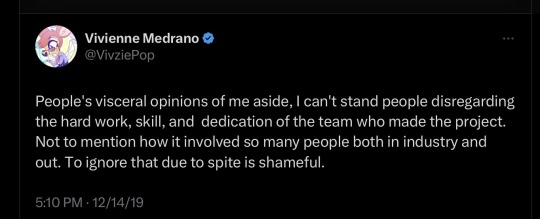
“I can take criticism” my fucking ass. 💀
Like….Viv, I don’t know what to tell you this but I’m not going to suck your dick and praise you for creating an indie animated project and push aside all of the issues I have with your writing solely because of the fact. You created an indie pilot. Cool beans. Good for you. Yes, the Hazbin pilot had talent and passion poured into it. Yes, the Hazbin pilot had effort put in, yes, ALL of your projects have effort put in it and it’s amazing how successful and famous you are, but nobody should have to stroke someone’s ego just because they worked hard and made something big. Disney’s Frozen was a huge and successful hit but that doesn’t mean I’m going to give it a pass and magically ignore all the issues I have with it. At the end of the day Viv’s writing is still dogshit and I’m not going to ignore it just because “she worked hard”. Like…genuinely I need people who have this mindset to grow the fuck up, get out of their diapers and stop acting like toddlers who need their hand to be held and act like they deserve to be praised nonstop.
Like………Imagine if one day Steven Spielberg just came out and went “Hey guys I was a huge inspiration of your childhood and a very successful man who directed smash hit movies that changed the entrainment industry for the better so that automatically means you can’t criticize me or ANY of my movies, only praise please because I worked so hard!” It just doesn’t fucking work like that.
#CLOWNS 🤡🤡🤡#vivziepop critical#spindlehorse critical#helluva boss critical#hazbin hotel critical#helluva boss critique#anti vivziepop#helluva boss criticism#helluva critical#rant#criticisms#critique#critical#feedback
161 notes
·
View notes
Note
hello Mr. Flanagan,
My name is Anthony. Just want to start off by saying that I love everything you've made. There's something I can relate to in every one of your projects and I eagerly await your next works.
I'm in the process of rewatching the Haunting of Hill House because I want to write something for a website that's doing a month of articles centered around siblings. As someone who is very close with their siblings, Hill House has always had a special place in my heart. I cry multiple times per episode. The way you blend the feeling of the purity of childhood joy when you're around your siblings with the bitterness of adulthood baggage and how difficult it is to get out of your own way makes me feel so seen. I've been curious about the original novel and how there wasn't a family at the center of the story there. Did you know you wanted a family and talk about the relationships between siblings when you were going to adapt this story? You have talked about it before but I was wondering if you'd expand a little about your thought process behind that decision and why it was important to you that Hill House was about a family.
Side note, my mother is equally close to her five siblings. Recently the first sibling of the family passed and it's been a haunting experience. Your show is the first time I've felt that weight fully since the funeral and I feel so grateful. As you say in the show, a ghost is a wish and I know this grief I feel can be a gift as well. Thank you for putting your heart on the page and the screen like this.
With great admiration,
Anthony
Hi Anthony,
Ambling first approached me for HILL HOUSE, they had the television rights and were asking people for takes. I felt that the book had already been adapted perfectly by Robert Wise in 1963, and that there was little point in doing a direct adaption of the source material. It would need a lot of expansion to fit the long format (the book fits neatly into a 90 minute movie, and we needed 10 hours).
The sibling dynamic is one that is fascinating and important to me. Each of my parents is the oldest of six kids, and so I grew up watching those complex sibling dynamics at work. I'd really enjoyed exploring the sibling dynamics in OCULUS, and this seemed like an opportunity to take that much further.
I pitched Amblin on a take that repurposed the existing characters of the novel into a family unit, and expanded it with other fun references (Shirley is named after Shirley Jackson; Steven is named after Spielberg, etc).
I think SIX FEET UNDER is one of the greatest works of art ever created, and I thought the way they used the long format to examine such a beautiful and bittersweet tapestry of family is something I've long aspired to emulate. So my intention was always to do THE HAUNTING by way of SIX FEET UNDER and OCULUS, and luckily for me they liked that idea a lot.
My mother's family had suffered a devastating loss several years prior, and so a lot of the series became a way to process what I'd felt and witnessed in my family as she and her siblings dealt with the loss of one of their own. As long as the show was about family, grief, loss and living after the loss, I felt like we had something special. It just happened to also have ghosts.
But we were aligned from the start that HILL HOUSE wasn't a show about ghosts - it was a show about family, and the rest fell into place.
I'm sorry for the loss in your family as well, and thanks for reaching out. Best wishes to you and yours.
232 notes
·
View notes
Text
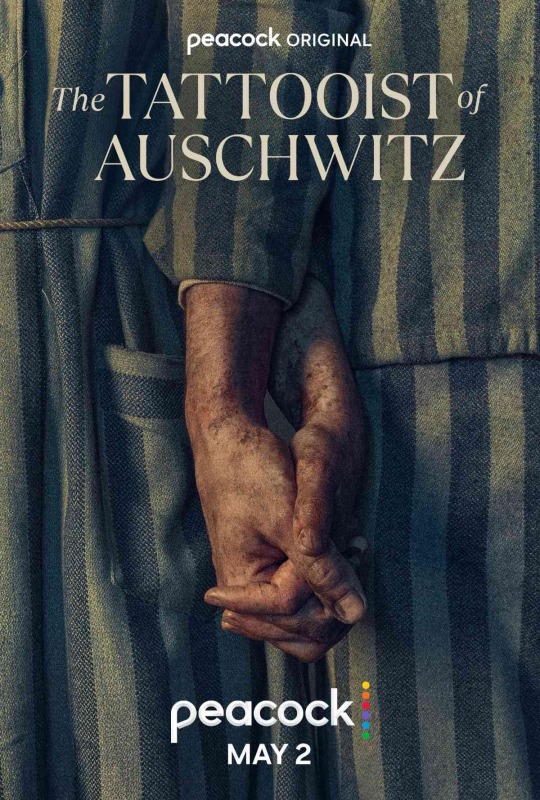
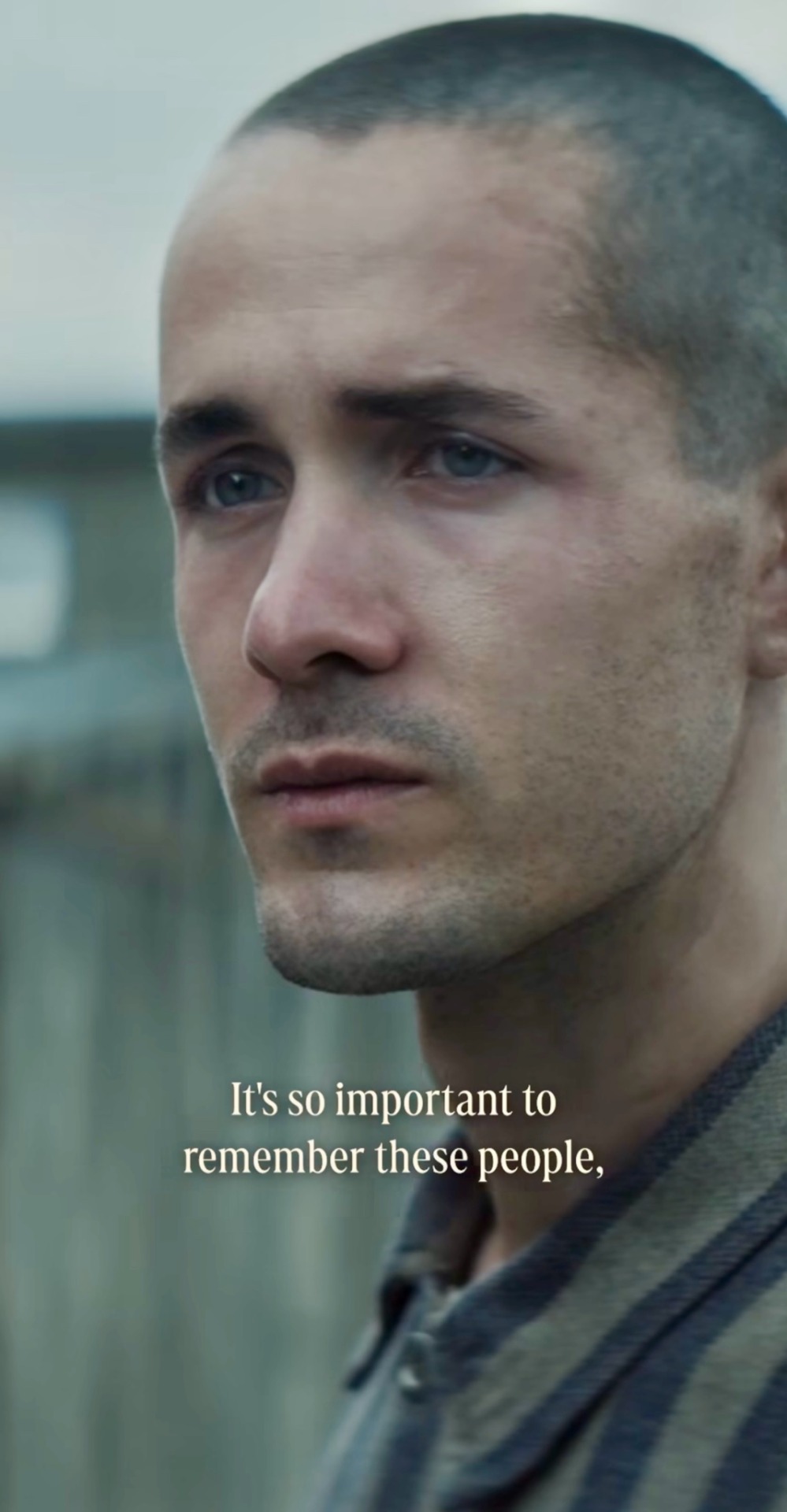
hi, I watched the series yesterday and thought I could share my little essay here. please, feel free to reach out if you saw it too, and want to talk 🥹
[I’m aware I’ve been quite loud about it in the past few weeks, but as the book’s fan, as a historic nerd, and also as Jonah and Anna’s fan, I felt the urge to write something after watching the series.] As we all know, the story of the Holocaust has been portrayed on screen many times, some of the most recognisable ones being Schindler's List (1993; Steven Spielberg), The Pianist (2001; Roman Polanski) or The Boy in the Striped Pyjamas (2008; Mark Herman) I believe The Tattooist of Auschwitz will become one of them. I think it’s very unique to tell a story like this in a way it was done by its creators. It’s important to know that the inspiration was the book written by Heather Morris, who meet Lale Sokolov in early 2000s, who was a tattooist at Auschwitz II-Birkenau after he was sent to the camp in 1942. He decided to share his life story with her, and then with the whole world. After hearing it, and then writing it, it has become Heather’s mission to spread his words. Although it’s based on his own experience, it’s historical fiction novel, which the author herself emphasises. [She said: "The book does not claim to be an academic historical piece of nonfiction, I’ll leave that to the academics and historians.”] The six-episode series directed by Tali Shalom-Ezer inspired by the book under the same name unfolds the life of a young Slovakian man who in horrific circumstances finds something, which keeps him going. The love for the Slovakian girl, Gita. The main characters, excellently portrayed by Jonah Hauer-King and Anna Próchniak, give the audience hope to see the light in the darkest of places, and that’s the most important message of the story. To remain human in the most dehumanised situation, to give love and to receive it. You can see every emotion in Anna’s face even though she doesn’t say anything in a particular scene. Her portrayal of strength, optimism, and faith in the centre of hell, brings out a light. You can see the pain in Jonah’s eyes with every "I’m sorry”, he whispers to his fellow prisoners when he’s made to put the number on their arms. They’re both intuitive, sensitive, and just brilliant actors, who carry the series alongside with equally excellent Jonas Nay as SS officer Stefan Baretzki, Melanie Lynskey as Heather Morris herself, and Harvey Keitel as older Lale, in the centre. I must say I was terrified of seeing Jonas’ portrayal on his every pace or look, which only proves how incredible actor he is. It was said by the Jonah and Jonas that they first created a bond with each other in order to later enact some disturbing, uneasy scenes. It enabled them to trust each other on the set. It was amazing to see Lynskey and Keitel acting together in scenes. Their chemistry can be really felt through screen. The idea of Lale being haunted by the ghosts of the past was incredibly incorporated, even then giving us the feelings of uneasiness, tense, and fear. As the director of the series said herself: "One misconception I would want to debunk would be that when the camps were liberated that everyone lived happily ever after. Trauma is a lifelong burden to carry for the survivors. This isn't a history lesson from the past. This is something that's very much alive.” I couldn't finish without saying something about the wonderful music that was created by Hans Zimmer and Kara Talve. You know it is good when you get shivers all over your body, and the same happens when you hear the haunting melodies of violins in the very first track. The whole soundtrack is available to listen to on music streaming platforms. This series is a must watch for everyone who read the book. It is incredibly well acted, well written, well made. You can feel the sorrow, the grotesque. The Tattooist of Auschwitz depicts the duality of the human nature on full display, showing the possibility to find a light in such a hellish place, and also unfolds the monstrous, evil side of what hatred makes of people.
#the tattooist of auschwitz#ttoa#my ramblings#no spoilers#jonah hauer king#anna próchniak#lale sokolov#gita sokolov
11 notes
·
View notes
Note
What was that crazy music video type thing you included on that post about ALW being an ass to Patti Lupone? I have never seen that before and I am both intrigued and horrified. I only recently got into Phantom, and all this craziness is just delighting me. 😂
For context, this is the video referred to in this ask:
youtube
This was a promo video done in 1985 (I think), to promote Phantom. Those are the original lyrics by Richard Stilgoe, which he wrote before Charles Hart was involved. You'll recognize a few here and there, but a lot of them are... weird, to say the least (weird enough for Cameron "Satan" Mackintosh to tell ALW to either find someone to help out Stilgoe, either outright fire him, or else he wouldn't produce Phantom anymore. And given it was proving to be a VERY costly show to make, even ALW knew losing CamMack was a no-no).
The staging is also different, because Trevor Nunn was the director at this point. And that's another funny (HA) story: ALW and Cameron Mackintosh had initially got Hal Prince to direct. And for those of you who don't know, Hal Prince is basically to musicals what Steven Spielberg is to cinema. He directed some of the most successful musicals of the latter half of the 20th century: Evita, Sweeney Todd, Fiddler on the Roof, West Side Story, Cabaret, Company... and that's the list of musicals I know even the uninitiated will recognize. So one day, on a whim, ALW decided to fire Hal Prince, which went about as well as you might expect: ALW chickened out of the dinner where he and CamMack were supposed to break the news to him, which led to CamMack having to sheepishly break the news to Hal Prince, who stormed out furious (AS HE SHOULD). Again, imagine yourself firing Steven Spielberg from making Saving Private Ryan and replacing him with, I dunno, the Russo brothers because The Avengers made a shit ton of money.
Why? My guess is that Hal Prince had the balls to tell ALW to stick it whenever he'd bring bad ideas on the table, so ALW basically decided to replace Hal Prince with the director for one of his previous musicals, Trevor Nunn (who is a decent director, mind you, making the comparison to the Russo brothers a little harsh).
Which musical was it, mind you? CATS.
IT ALWAYS COMES BACK TO CATS.
And Steve Harley? He was a rock singer who got picked up along the way because they urgently needed someone to play the Phantom in the music video, and full offense but he's a worse singer than Gerald Butler in my opinion, and at least the latter could actually act. ALW realized that they needed someone else, and he basically smuggled the score to a comedic actor called Michael Crawford, who had some prior experience singing in musicals (he's in the film adaptations of A Funny Thing Happened on the Way to the Forum and Hello Dolly, if you're interested), but he wasn't exactly the guy you'd think of for the Phantom? Thankfully, he proved everyone who might have doubted him wrong, and amazingly at that, but he was a gamble at the time nonetheless.
And as you may guess, the music video was kind of poorly received, and Trevor Nunn worked on a little musical called Les Misérables, which got piss poor reviews and ALW was at the head of them (CLASS ACT, THAT FELLOW). But the uneducated, unwashed plebs loved it so I guess that's the reason why it's still playing today, and not because it's one of the most beautiful scores ever written for musical theatre, summing up a 1,000 book perfectly and conveying emotions that could make angels cry, nah. /s Anyway, that led to ALW firing Trevor Nunn, and begging Hal Prince to come back, and he agreed - which really goes to show how gracious he is because I would have laughed in ALW's face.
And what happened to Steve Harley, you may ask? He found out with a call from CamMack that he was fired, with no explanation whatsoever, and it was only later that he found out Michael Crawford had replaced him. I mean, was it for the best? Yeah. Do I still feel kind of bad for Steve Harley? Yeah.
So yeah, thank your lucky stars Hal Prince, Charles Hart and Michael Crawford agreed to be in this. I'd also add Maria Bjornson, but I really wonder now how she got involved in the first place because if that came from ALW, that might be the single best decision he ever made in his entire life. But I don't have any trust in him whatsoever to pull that off lmao
#lord-valery-mimes#phantom of the opera#Andrew Lloyd Webber#Hal Prince#Cameron Mackintosh#Charles Hart#Richard Stilgoe#Trevor Nunn#Michael Crawford#Steve Harley#and now you know
104 notes
·
View notes
Text
After ‘Challengers,’ Cannes and the Chopard Trophy, Mike Faist Is Taking a Break
by: RHONDA RICHFORD 23 MAIO 2024
CANNES — It’s been a busy spring for Mike Faist. First came love, lust and tennis drama “Challengers,” costarring Zendaya and all the resulting hoopla from the film’s sexy scenes, followed by the Trophée Chopard and the Cannes red carpet.
Now the 32-year-old actor is taking a break.
“I need to take time, some time, any time,” he says, coming down from the media frenzy.
Stepping into “Challengers” with Zendaya and Josh O’Connor put him not only in the center of an on-screen love triangle but also of the media frenzy surrounding the film.
“I wasn’t prepared,” he says. “It was something that was really daunting, and it terrified me at first, and then it was about letting that go and just kind of showing up utilizing it.
“I kind of had to face the music at some point and say, ‘All right, how do I engage with all of this attention? And how do I utilize it so I can get to the thing that actually matters most to me, which is the work itself?’ But it was daunting, terrifying, scary, because I’m not hiding behind the character at that point.”
He bonded with fellow Trophèe Chopard winner Sophie Wilde on their fear of public speaking. “We’re terrified because we had to actually speak. We all have impostor syndrome is the reality of the situation. You kind of just start to question the validity of any of this. Like, ‘Why me?’ and it’s overwhelming.”
Faist recognizes the Trophée Chopard has gone to some stellar names: Gael Garcia Bernal, James McAvoy, John Boyega, Kingsley Ben-Adir, to name a few since its inception in 2001.
“The truth of the matter is, I feel very honored. And at the same time, it’s always an uncomfortable thing, walking a red carpet, having your picture taken,” he says. “It’s an honor to be here, and at the same time I can’t help but be like, ‘Oh my god, I just want to hide.’
“I think most actors are probably very shy — if you’re a good one. Putting yourself out there in that way is terrifying, and we all try to hide behind characters. That’s how we’re able to be our most vulnerable, is by clowning. By being able to put on a character, put on a performance, put on a different person’s skin, that’s how we’re able to express ourselves in our truest sense.
“It’s a mind trick,” he continues. “So getting on a red carpet, you’re actually not hiding behind a character. You’re just you, and that’s an awful feeling.”
Walking the Cannes red carpet, he also attended the screening of Francis Ford Coppola’s personal magnum opus “Megalopolis.”
“Francis Ford Coppola, Steven [Spielberg], Martin Scorsese — all those guys growing up in the ’70s directing and the actors that they used are major, major influences for me,” Faist says.
Notice that he’s on a first name basis with one on that list, specifically Spielberg, who he worked with in “West Side Story.”
Not just a first name basis, even a nickname. “I call him ‘kid,’ because when you’re on set with him, he’s just a child, he’s so youthful and has so much energy, and he genuinely loves this. And that energy is so infectious,” he says. That energy and enthusiasm has remained with Faist to this day. “He’s one of those examples that I’m like, ‘What would Steven do?’ in any situation.”
Those old school acting performances still resonate. He recently used James Dean in “Giant” to get into character for last year’s West End stage production of “Brokeback Mountain.”
“I felt very lost, and I wasn’t sure whether or not I was really able to do the play. I didn’t feel like I had a way in. Then I watched that movie, I watched his performance, and said, ‘OK, I think I have a way.’”
He reels them off: Fred Astaire, Gene Kelly, Robert De Niro and Al Pacino.
“They’re extremely informative in terms of feeding my own work and using it and taking it and scrambling it up a little bit and projecting it out there,” Faist says.
“Those are giants,” he adds. “I think it’s really easy to get swept up in a desire to be famous, but the reality is that none of those guys got into it for that reason; they got into it for the love of the craft and the work. If that remains your true north, that’s my goal.”
With the success of “Challengers,” there are projects brewing, scripts being read and roles being offered. But while Faist is riding the big media wave, he is cautious enough not to take what is being thrown his way.
“You can’t just say yes to everything,” he says. “I have to decide whether or not I’ve actually something to contribute.”
It’s a screenplay he has been working on since before “West Side Story,” but with that movie and all the ensuing work, the screenplay has been on the backburner. Still brewing, still stirring, and still adding little bits here and there. “It’s something I haven’t been able to let go of, which indicated that I need to see it through to its completion.”
Link: https://wwd.com/eye/people/challengers-cannes-chopard-mike-faist-1236397497/

11 notes
·
View notes
Note
Any headcanons for Steve Scott from Vice City? And out of everyone in the Vice City cast, who do you think Steve would date?
Give the film director some love there!
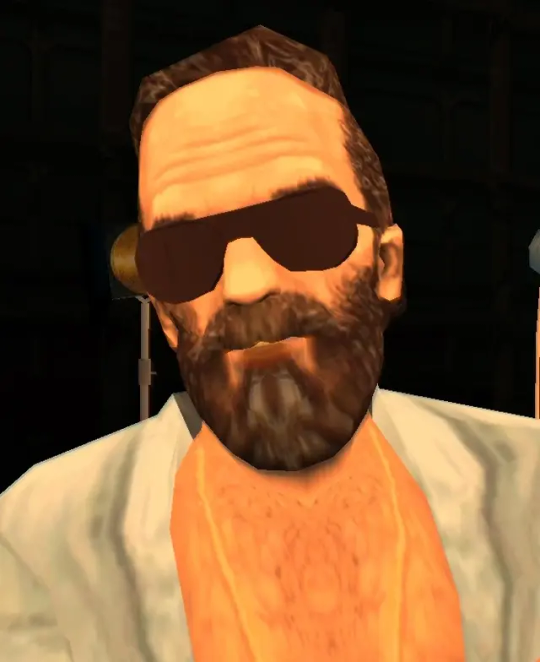
This character is quite mysterious and episodic to me, but I can come up with a few headcanons for him.
His appearance and background are definitely a reference taken from Steven Spielberg, but in Rockstar's style, it has been post-ironically altered towards the direction of him making adult films.
He might be acquainted with Reni Wassulmaier since both are involved in the film industry and are producers/directors.
He should have a star on the Walk of Fame in Vinewood. Oh, he had the one!
I consider him a fan of Vinewood and the entire film industry. Besides Vice City, he also worked in Los Santos on a film set. Perhaps his dream was to make it in Vinewood, and eventually, he did become successful.
If we consider that in one of the missions with Tommy Vercetti he evaluated his appearance for filming, it's likely that his adult films are not limited to just hetero. And remembering Martha from the mission with Candy Suxx, among others.
In theory, he could be date with Candy Suxx, but I think it would be only episodic. He would probably be more focused on his work, and such contacts would be short, if not one-time.
Overall, he seems like the type of person who would eventually be accused of sexual harassment, but let Rockstar handle that satire, as I'm very distant from the film industry.
7 notes
·
View notes
Text
The Oscars were announced today and while there is plenty that I am happy about disappointment still abounds. No love for SALTBURN. I knew Best Actor was crowded and Barry Keoghan may not get in,
AMPAS how can you deny him?
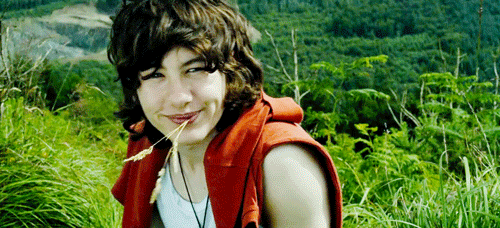
but I was sure of a Rosamund Pike nomination. Was holding out hope for a Dominic Sessa, or even unlikelier a Milo Machado Graner nomination for their respective works in THE HOLDOVERS and ANATOMY OF A FALL.
And while not personally disappointed (more disappointed by her BABYLON snub), very surprised that Margot Robbie didn't secure a nomination for BARBIE yet America Ferrera did.
Ryan Gosling speaks on Margot and Greta Gerwig's omission.

Not surprised by Andrew Scott not getting a nod - he didn't even get one from the BAFTAs - I just think there wasn't enough meat on the bones for that role.
Not surprised by Leonardo DiCaprio not securing a nomination as he's been pretty much absent from these conversations. What bothers me is that everyone I talk to about KILLERS OF THE FLOWER MOON pan his character, but not his performance. They hate that his character is stupid. They don't even touch on he's a bad person for poisoning his wife; no. It's his stupidity. So they hate that weakness in him and it blinds them to Leo's performance. Even director Paul Schrader whinged about how stupid the character was and Leo should have played the role originally offered to him; the FBI agent played by Jesse Plemons.
I love comparing who were being pushed to who actually got the big nomination.
Sorry Andrew, Greta, Julianne, Margot, Eve and Fantasia.


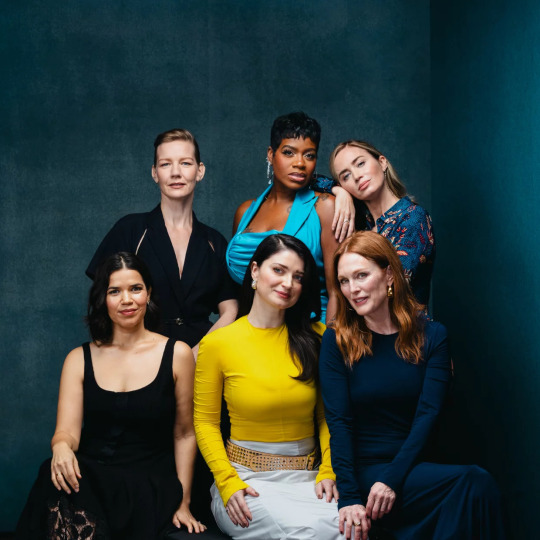
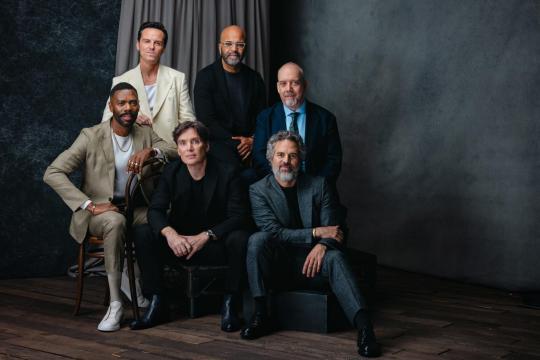

The Nominees.
Best Picture
American Fiction
Anatomy of a Fall
Barbie
The Holdovers
Killers of the Flower Moon
Maestro
Oppenheimer
Past Lives
Poor Things
*I only just found out Ramy Yousef, Willem Dafoe and Mark Ruffalo are in this poster.
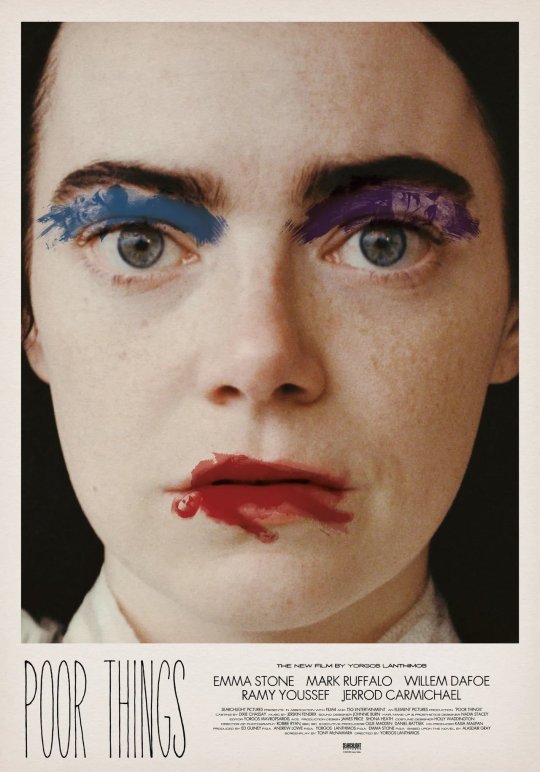
The Zone of Interest
Best Director
Justine Treit (Anatomy of a Fall)
Martin Scorsese (Killers of the Flower Moon)
Christopher Nolan (Oppenheimer)
Yorgos Lanthimos (Poor Things)
Jonathan Glazer (The Zone of Interest)
Best Actor in a Leading Role
Bradley Cooper (Maestro)

Colman Domingo (Rustin)
Paul Giamatti (The Holdovers)
Cillian Murphy (Oppenheimer) - when asked what he would eat as the Oscars do not serve food, he said he will bring a piece of his mam's sponge cake snuck in his wife's purse.
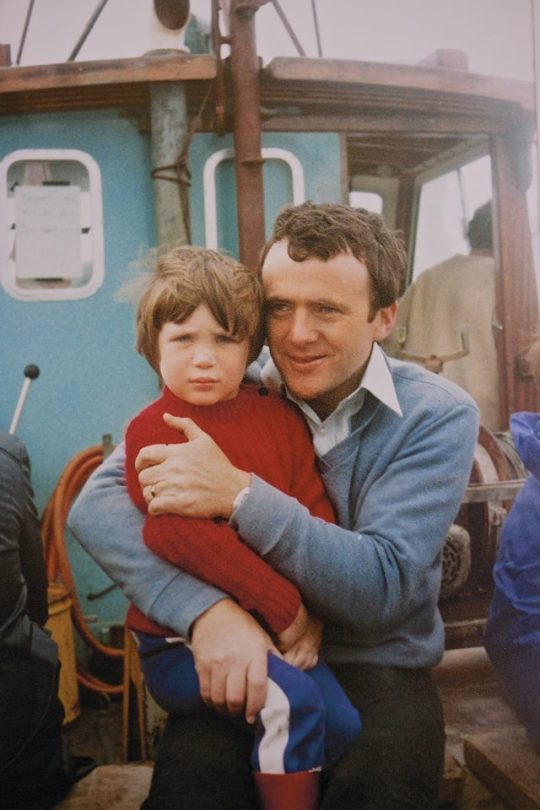
Jeffrey Wright (American Fiction)

More Nominations and Oscar Nom Talks
Thrilled for Bradley Cooper as a lot of people were turning on him because they viewed him as a award desperate try-hard. But he really just cares so much about this role. He screened A STAR IS BORN for Steven Spielberg and when the "Shallow" scene came on Spielberg got up and whispered in his ear, "You are fcking directing MAESTRO". When you are given given that must trust by arguably one of the greatest filmmakers ever, of course you're going to be extra to the nth degree.
Not sold on Cillian Murphy's performance in OPPENHEIMER. It did nothing for me, but I'm happy he has had this award season experience. He stays outside of actors' circle and - based on absolutely no proof- I just think he probably felt it al superficial, but when he won his Globe and thanked his fellow actors I can tell he was sincere. I think coming together with his peers in a real way; not just mingling at parties, but by being in spaces where they discuss their craft and inspirations let him recognize that no matter how big the name, these are his tribe and they see the art and value of what they do. Awards season friendships are cool to see. I didn't see one this season but Bradley Cooper said he and Colman Domingo have become buddies this season after doing a photoshoot together.
Best Actress in a Leading Role
Annette Bening (Nyad)
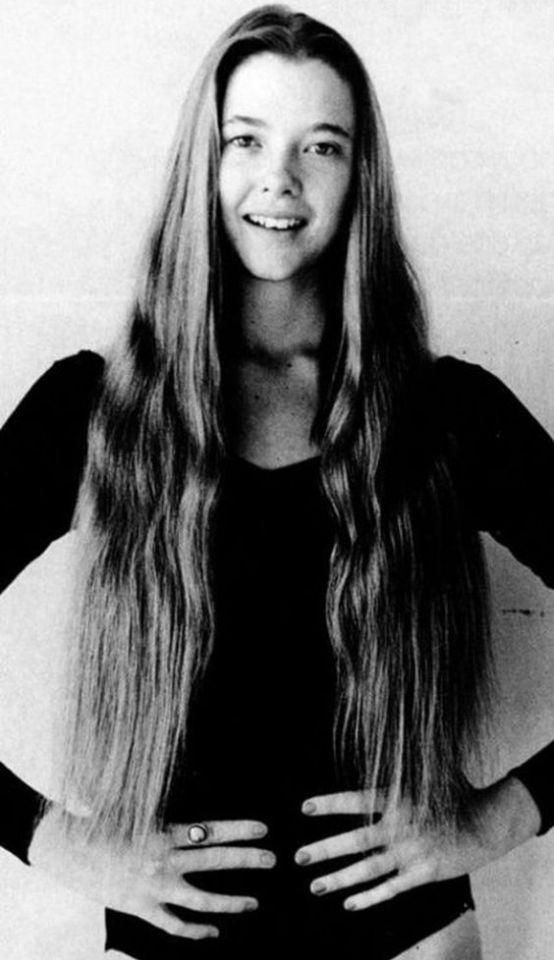
Lily Gladstone (Killers of the Flower Moon)
Sandra Hüller (Anatomy of a Fall)
Carey Mulligan (Maestro)
Emma Stone (Poor Things)
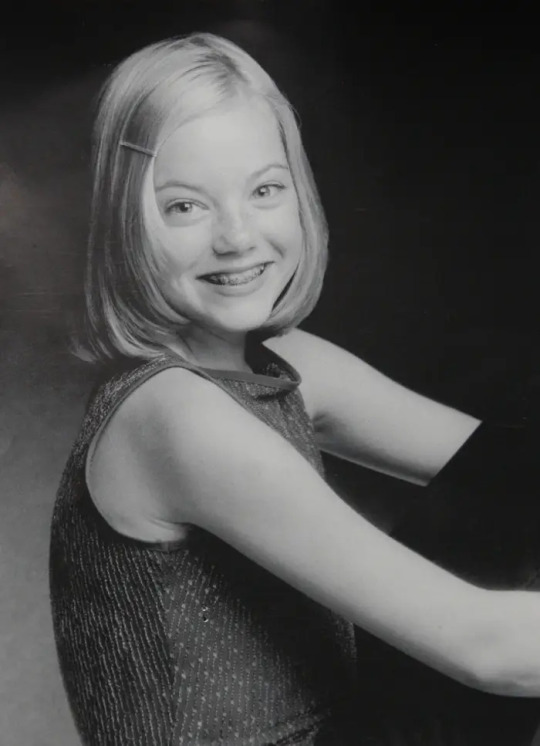
*Minus Sandra Hüller this is pretty much how I viewed how this category would shape up. Very funny to me that when POOR THINGS started screenings critics swore up and down it was an embarrassment to Emma Stone's talent and she would get nothing.
Best Actor in a Supporting Role
Sterling K. Brown (American Fiction)
Robert De Niro (Killers of the Flower Moon)
Robert Downey Jr. (Oppenheimer)
Ryan Gosling (Barbie)
Mark Ruffalo (Poor Things)
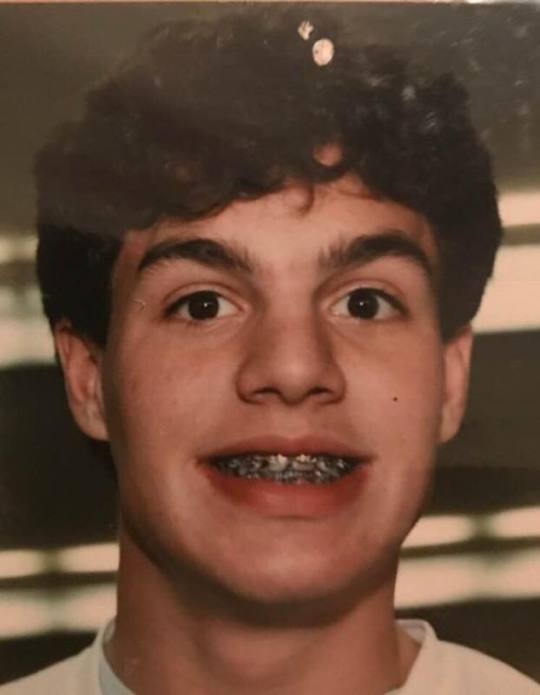


*I honestly felt that Sterling K. Brown could be the upset and I was so happy to be right. His performance in AMERICAN FICTION is a breath of fresh air. I honestly wanted more of his character.
What I like about his Mark Ruffalo's nominations are that they both didn't think these roles would lead to this.
Brown said his publicist kept pushing him for interviews and panels this season and he couldn't understand why as he thought it was such a small role and he was just satisfied with being in the film, but his publicist saw the reactions to Brown's character and knew it was awards worthy.
Ruffalo said he didn't think he could do his POOR THINGS role because he's been so pigeon-holed and was accustomed to playing roles that were the anti-thesis of Duncan that he wasn't sure he could find him. Having people trust in you when even you yourself don't have that trust, or trying even while in doubt of yourself is beautiful.
Best Actress in a Supporting Role
Emily Blunt (Oppenheimer)
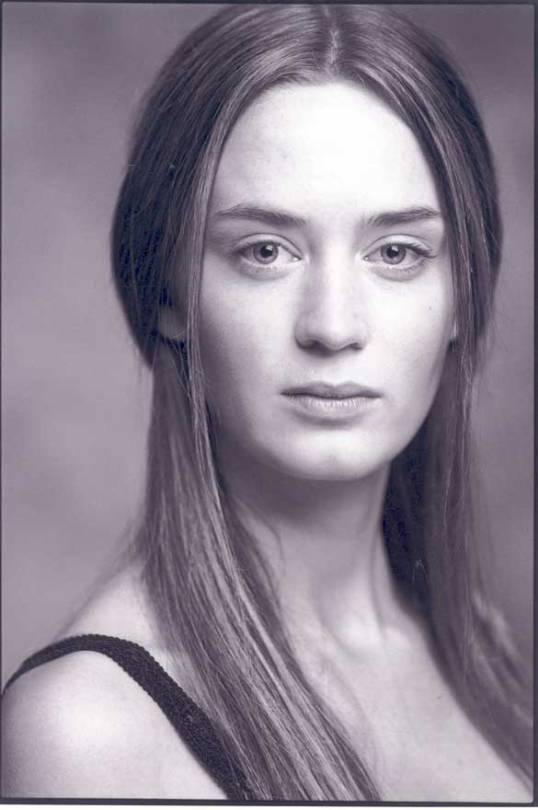
Danielle Brooks (The Color Purple)

America Ferrera (Barbie)
Jodie Foster (Nyad)
Da’Vine Joy Randolph (The Holdovers)
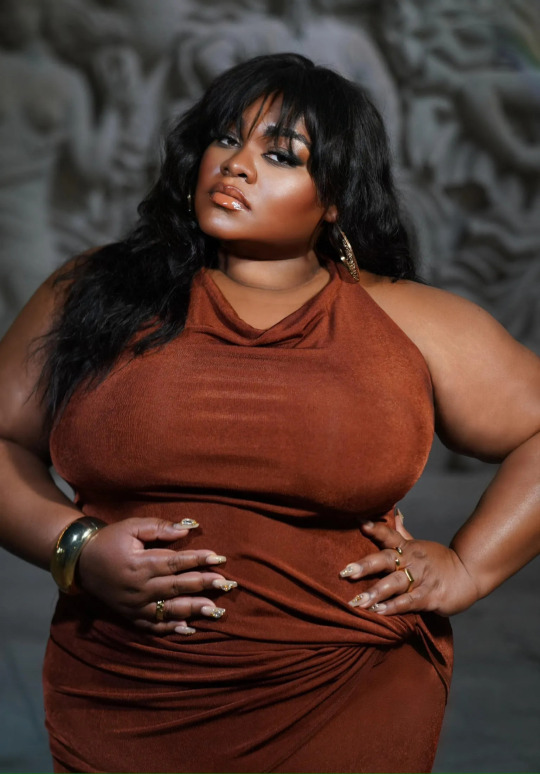
*America Ferrera should be nowhere in this category. It should be Rosamund Pike 1000%. So happy that Danielle Brooks and Da'Vine Joy Randolph were both nominated as I was afraid the voters would only pick one over the other. Kinda surprised by Jodie Foster, but hers was a nomination I was really hoping for.
Best Writing (Adapted Screenplay)
American Fiction
Barbie
Oppenheimer
Poor Things
The Zone of Interest
Best Writing (Original Screenplay)
Anatomy of a Fall
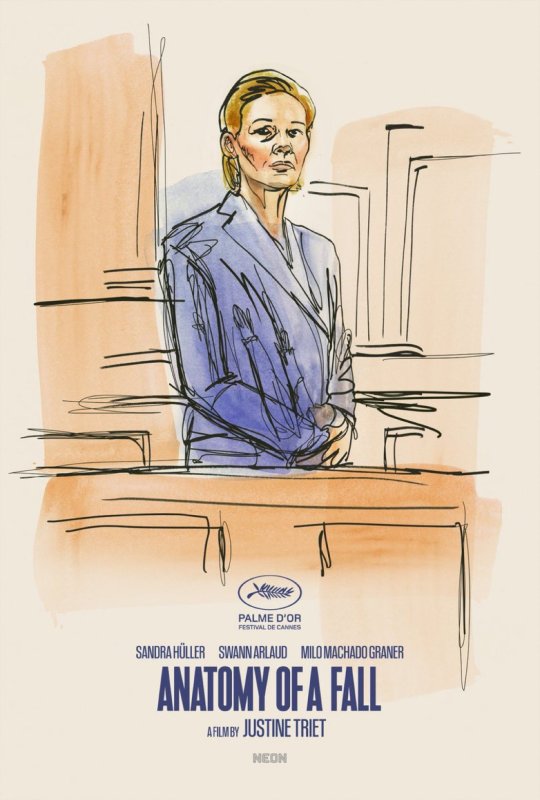
The Holdovers
May December
Past Lives
Maestro
Best Animated Feature
The Boy and the Heron
Elemental
Nimona
Robot Dreams
Spider-Man: Across the Spider-Verse
Best Documentary Feature Film
Bobi Wine: The People’s President
The Eternal Memory
Four Daughters
20 Days in Mariupol
To Kill a Tiger
*I forget the film but last year Dev Patel threw his support behind an International Documentary. He wasn't involved in it, but he did Zoom Q&As promoting it. This year he backed TO KILL A TIGER, going further this time to become an executive producer on it. This is the way to use your profile - uplifting other artists whose projects don't have the reach.


Best Cinematography
Killers of the Flower Moon
Maestro
Oppenheimer
Poor Things
El Conde
*Would much rather SALTBURN be in this category, but very happy for EL CONDE to be recognized.
Best Costume Design
Barbie
Killers of the Flower Moon
Napoleon
Oppenheimer
Poor Things
Best Makeup and Hairstyling
Golda
Oppenheimer
Poor Things
Society of the Snow
Maestro
*Gotta go to makeup maestro Kazu Hiro.
Best Animated Short Film
Letter to a Pig
Ninety-Five Senses
Our Uniform
Pachyderme
War Is Over! Inspired by the Music of John & Yoko
Best Live-Action Short Film
The After
Invincible
Knight of Fortune
Red, White and Blue
The Wonderful Story of Henry Sugar
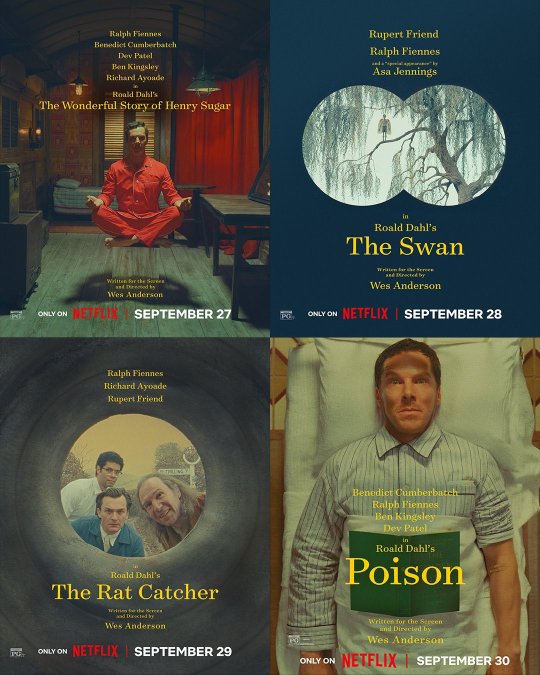
*I'm 100% behind THE WONDERFUL STORY OF HENRY SUGAR, though I preferred the short within the quandrant of films THE SWAN starring Rupert Friend. As long as the shallow Pedro Almodóvar short STRANGE WAY OF LIFE wasn't nominated, I'm good.
Best Original Song
“The Fire Inside” (Flamin’ Hot)
“I’m Just Ken” (Barbie)
“It Never Went Away” (American Symphony)
“Wahzhazhe (A Song For My People)” (Killers of the Flower Moon)
“What Was I Made For?” (Barbie)
*Was really rooting for one John Carney's two songs from FLORA & SON to get a nod. He's been twice nominated (winning one) for Best Song, but since not gaining a nod for SING STREET (a robbery!), he just haven't been able to gain ground.
Best Original Score
American Fiction
Indiana Jones and the Dial of Destiny
Killers of the Flower Moon
Oppenheimer
Poor Things
*Should have been a space for Anthony Willis who did the score for SALTBURN but everyone has to kiss John Williams' ring and Robbie Robertson passed away so they have to recognize him. Though, if pushed came to shove, I preferred Robertson's score over Williams'.
Best Documentary Short Film
The ABCs of Book Banning
The Barber of Little Rock
Island in Between
The Last Repair Shop
Nǎi Nai & Wài Pó
Best International Feature Film
Io Capitano (Italy)
Perfect Days (Japan)
Society of the Snow (Spain)

The Teacher’s Lounge (Germany)
The Zone of Interest (United Kingdom)
*Haven't been able to see THE ZONE OF INTEREST because A24 kept bollocksing up their screenings (same with THE IRON CLAW), but I hear it's great. I'm 1000% behind SOCIETY OF THE SNOW. I really hoped that JA Bayona was able to break out and make it into the Best Director category, but sadly, it didn't happen,
Best Production Design
Barbie
Killers of the Flower Moon
Napoleon
Oppenheimer
Poor Things
Best Film Editing
Anatomy of a Fall
The Holdovers
Killers of the Flower Moon
Oppenheimer
Poor Things
*Again, another category SALTBURN should have been nominated in.
Best Production Design
Barbie
Killers of the Flower Moon
Napoleon
Oppenheimer
Poor Things
Best Sound
The Creator
Maestro
Mission: Impossible – Dead Reckoning Part One
Oppenheimer
The Zone of Interest
Best Visual Effects
The Creator
Godzilla: Minus One
Guardians of the Galaxy Vol. 3
Mission: Impossible — Dead Reckoning, Part One
Napoleon
#oscars#academy awards#saltburn#barry keoghan#dev patel#anatomy of a fall#emma stone#poor things#mark ruffalo#sterling k. brown#danielle brooks#colman domingo#davine joy randolph#paul giamatti#the holdovers#robert downey jr#cillian murphy#oppenheimer#nyad#annette bening#actors#society of the snow#jeffrey wright#american fiction#barbie#ryan gosling#killers of the flower moon#robert deniro#rustin#the color purple
8 notes
·
View notes
Photo
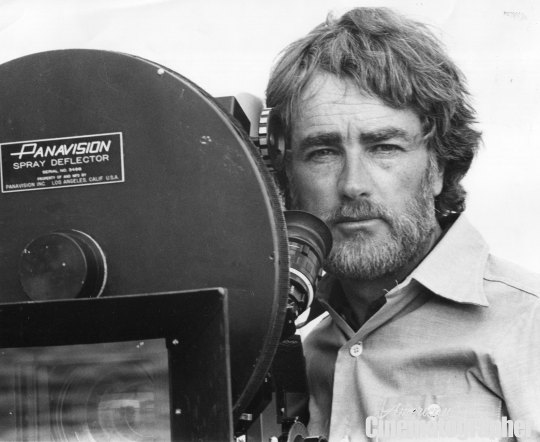
“I hear you’re making a movie about a fish,” the cinematographer Bill Butler said to the young director Steven Spielberg when they bumped into each other on the Universal lot in 1974. Butler, then in his early 50s, had already shot two projects for Spielberg – the TV movie Something Evil (1972) and Savage (1973), a pilot that was not taken up as a series. But it was their collaboration on the “fish movie” that cemented their reputations.
Summer was not previously regarded as an optimum time to release a big studio picture, which is why Jaws (1975), which flooded screens across the US rather than trickling out in stages, is considered the first summer blockbuster – though its finesse and skill, not to mention an intimate second half in which the cast dwindles to three men and a largely unseen shark, give it little in common with the sort of crash-bang-wallop productions that followed in its wake.
It remains one of the finest slow-burning suspense movies outside Hitchcock in his heyday, due in no small part to the cinematography by Butler, who has died aged 101. The production was besieged with difficulties but in 2003 Spielberg called him “the calm before, during and after every storm on the set of Jaws”.
Butler shot about 90% of the ocean scenes with a handheld Panaflex camera for greater flexibility and immediacy. Borrowing a trick he had picked up while shooting second unit on the thriller Deliverance (1972), he also made a transparent box into which the camera was placed to allow for shooting at water level. The effect, he explained, was dramatic and instantaneous. “The big advantage is that psychologically you’re asking: ‘What’s right below the water? Is that shark right there?’” Shots of the thrashing legs of oblivious swimmers “made the audience think: ‘That must look good to a shark. It looks like dinner time.’”
Jaws was one of two best picture Oscar nominees that year in which Butler had a hand, the other being Miloš Forman’s One Flew Over the Cuckoo’s Nest, the eventual winner, based on Ken Kesey’s novel about patients in a psychiatric hospital. Butler was Oscar-nominated for Forman’s film along with Haskell Wexler, who had shot the lion’s share of the footage before being sacked. It was a stormy set, with the actor Jack Nicholson refusing to speak to the director and communicating instead with Wexler and then Butler, who reportedly shot everything from the climactic party scene onwards. A year earlier he had replaced Wexler on Francis Ford Coppola’s brooding surveillance thriller The Conversation (1974).
After Jaws, Butler’s biggest commercial successes were the musical Grease (1978) as well as three consecutive sequels to Sylvester Stallone’s 1976 boxing drama Rocky, beginning with Rocky II (1979). Butler brought a special vitality to the fight scenes in the series, occasionally shooting with as many as eight cameras simultaneously. “As carefully as we planned, there were times when we expected to pan left and something unexpected happened, and we needed to go to the right or zoom instead,” he said. “When an actor slipped, we caught the expression of surprise on his face.”
Some projects even he couldn’t save. Can’t Stop the Music (1980), a vehicle for the disco group the Village People, was a flop that later acquired a cult following. That honour eluded another musical, Graffiti Bridge (1990), starring and directed by Prince. It was shot by Butler, once again serving as an 11th-hour replacement, at the singer’s Paisley Park studios near Minneapolis.
Butler was born in Cripple Creek, Colorado, to Wilmer, a farmer, and Verca, a psychiatric nurse. The family moved to Henry county, Georgia, when he was five, then on to Mount Pleasant, Iowa. He was educated at Mount Pleasant high school and received a degree in engineering from the University of Iowa, where he became fascinated with cameras. He worked for four years as a radio station engineer while also setting up a television station that was later sold to ABC.
Next he got a job at the Chicago-based WGN-TV, where he met the director William Friedkin. Their documentary The People Vs Paul Crump (1962), about an African American man on death row, was screened for Otto Kerner, the governor of Illinois, in rough-cut form the night before Crump was due to be executed. Examining the evidence presented in the film, Kerner changed the sentence to life without parole. “I remember thinking: ‘My God, film has this kind of power?’” said Butler. “That little 16mm film saved someone’s life.”
For Philip Kaufman, Butler shot Fearless Frank (1967), starring Jon Voight as a man who is killed then resurrected as a superhero crime-fighter. He collaborated for the first time with Coppola on the director’s road movie The Rain People (1969), then shot Nicholson’s directorial debut, Drive, He Said (1971).
Among his later credits are the baseball comedy-drama The Bingo Long Travelling All-Stars & Motor Kings, the rape revenge thriller Lipstick (both 1976), Demon Seed, in which Julie Christie is impregnated by a malevolent computer, the conspiracy thriller Capricorn One (both 1977), the horror sequel Damien: Omen II (1978) and two military comedies, Stripes (1981) and Biloxi Blues (1988).
Butler was lauded for his television work: he won an Emmy each for Raid on Entebbe (1976), based on a real-life hostage rescue mission in Uganda, and an adaptation of A Streetcar Named Desire (1984) starring Ann-Margret as Blanche DuBois. He was nominated for another for shooting the steamy mini-series The Thorn Birds (1983).
In 1997 he shot a pair of films that echoed his past glories: the monster movie Anaconda owed more than a little to Jaws, while Don King: Only in America, made for TV, utilised his expertise in rendering ring-craft. For the latter, Butler built a box camera that the actor Danny Johnson, who played the world heavyweight champion Larry Holmes, could physically attack. Johnson “pulverised the lens”, said the director, John Herzfeld. “He literally beat it to shit. You’re completely in a subjective point of view.”
Butler maintained that the 1970s were the “perfect time” for him to make his name. “It was a merging of a lot of film styles that up until then had been very staid, very straightforward. There were certain rules you didn’t break, except I was one of those people that came to break all the rules.”
He is survived by his second wife, Iris (nee Schwimmer), their children, Genevieve and Chelsea, and three daughters, Judy, Patricia and Pam, from his first marriage, to Alma (nee Smith), which ended in divorce in 1983.
🔔 Wilmer Cable Butler, cinematographer, born 7 April 1921; died 5 April 2023
Daily inspiration. Discover more photos at http://justforbooks.tumblr.com
25 notes
·
View notes
Note
anything you’ve been watching/reading lately that you’d recommend? i think you have stellar taste in media (aka it often matches mine lol) so am curious! hope you feel better soon 💖
Ummmm yes, love this ask!!! (Also I’m so flattered 🥰 you have great taste as well btw)
Books:
Mo Ryan’s Burn It Down! If you’re at all interested in the entertainment industry and how it all gets made, this is basically required reading
the Succession script books (pricey but personally worth it)
I just finished Jill Gutowitz’s Girls Can Kiss Now and felt very seen, a wee bit too relatable
And I’m currently also reading Ann Patchett’s This is the Story of a Happy Marriage, which is a great book for my fellow writers to read
Substack:
I’m a paid subscriber to Hunter Harris’ Hung Up newsletter and I’ve never once regretted it lol
Gotta shout out Dracula Daily as well as the one podcast I listen to rn, re: Dracula (I listen and read at the same time which is perfect for me lol)
Gilmore Women - a Gilmore Girls recap newsletter that talks about everything wrong with each episode lol. I sped through the first six seasons and now I’m depressed that I’m caught up lol
TV:
Minx s2 - it is on Starz which I know most people don’t have but this season has been EXCELLENT
Only Murders in the Building s3 - it’s like a comfort show for me at this point, despite being about murder it makes me feel so cozy. Nora Ephron vibes
The Bear s2 - everyone’s been talking about it already but I just finished and god it was GOOD
The Sopranos - everyone should be doing # Sopranos Sunday with me!!! It’s so fun!! This show is soooo good, really living up to the hype for me
Acapulco - really cute show, makes me wish I was still on vacation in Mexico
Poker Face - bring back standalone episodes like this!!! Bring back character actors doing incredible guest star roles!!!
The Other Two - just. It was the funniest show on TV. It really was. 30 Rock’s spiritual successor which is pretty much the highest praise I can give it
Movies:
Red Eye - I rewatched it after Oppenheimer and it really holds up. Fun, tight thriller that is only like an hour 20 lol. Also Brian Cox aka Logan Roy is in it (and Jayma Mays my beloved)
Theater Camp - as a Jewish theater kid who went to and/or worked at a summer camp every year of her life from ages 4-20, there was no way I wasn’t gonna like this
Mamma Mia series - obviously everyone on tumblr knows about these already but I made my family watch them with me for the Fourth of July and god if I could live in the world of any movie it’d be this one ❤️
Man Up - very cute & fun British rom com I first discovered in college and rewatched this summer. Everyone has incredible comedic chemistry in this, and Lake Bell & Simon Pegg have great sexual chemistry as well (quite a lot of British faces who were nobodies when this was made who’ve gone on to bigger things - most notably Phoebe Waller-Bridge who’s only in a single scene)
X-Men: First Class - my favorite superhero movie ❤️
Indiana Jones series - I rewatched the whole series and saw the new one in theaters this summer. The first and third are literal masterpieces. Second one is mean spirited and racist. Fourth actually has quite a bit of charm, but then it fell apart in the back half. The new one…woof. Nobody but Steven Spielberg should be allowed to direct Indy movies.
Asteroid City - the longer it’s been since I saw it, the more and more I think it might be Wes’ masterpiece
Past Lives - incredible. But I know you already know that one lol
Are You There God, It’s Me Margaret - perfect, perfect film.
The Other Guys - we need Adam McKay and Will Ferrell to get back together, the fate of studio comedies hangs on this (anyway this movie is hilarious - but also if hell is real Marky Mark is obviously gonna burn for all eternity)
Comedy:
John Mulaney: Baby J - I saw him do this special live when he was touring it and I’m mad he cut the FBI bit but he’s still got it
12 notes
·
View notes
Text

Gareth Edwards
Dynamic Sci-Fi Director Envisions an Artificial Intelligence-infused World Decades From Now in His Latest Film The Creator
by Brad Balfour
Employing actors with global reputations and locations all over the world, master sci-fi film director Gareth James Edwards has now put out The Creator. The film considers the effects of the Artificial Intelligence revolution in technology some 40 years from now. It stands the Terminator premise on its head and drives a whole re-think on the supposed “menace” of AI.
As if it’s a metaphor for the Vietnam war as much as anything else, future America and its allies are in a conflict between the human race and the forces of artificial intelligence which have taken root in many Southeast and Far-East Asian countries. While AI-enhanced androids have merged with the general human population there, the USA has prohibited them and is committed to destroying Asia and its robotic allies.
Entering the mix is Joshua (John David Washington), a hardened ex-special forces agent grieving the disappearance of his wife Maya (Gemma Chan), one of the leaders of the Asian-AI community and resistance. After having been undercover among the AI community — where he met and wed Maya, Joshua had reluctantly been removed from the area. He had then been recruited to return and hunt down the Creator, the elusive advanced AI designer/programmer who has developed a mysterious weapon with the power to end the war and destroy Nomad, the American super weapon — a computer-enhanced airborne battleship. Ironically, it depends on sophisticated computer technology to fight its anti-AI war. Joshua and his team of elite operatives venture into enemy territory, invading the heart of AI-occupied territory to find and destroy Nirmata — an AI in the form of a young child.
Born on June 1, 1975, in Nuneaton, Warwickshire, the young Edwards admired movies such as the original 1977 classic Star Wars and went on to pursue a film career. The Welshman even cites George Lucas and Steven Spielberg as his biggest influences. He got his start in special visual effects, working on shows that aired on networks such as PBS, BBC and the Discovery Channel. In 2008, he entered the Sci-Fi-London 48-hour film challenge, where a movie had to be created from start-to-finish in just two days (which he won). Then he wrote and directed Monsters, his first full-length feature, which was shot in only three weeks. Edwards personally created the film’s special effects by using off-the-shelf equipment. Aside from its two main actors (real-life couple Scoot McNairy and Whitney Able), the crew consisted of just five people. The $500,000 thriller received a riotous reception and was released to great success.
The impact of Monsters resulted in Edwards becoming an alt-sci-fi movie-making star. With offers from major studios, Warner Bros. tapped him to direct an English-language reboot of the 1954 Japanese classic Gojira. His Godzilla re-visioning garnered mixed reviews but did tremendous box office. Following its success, producer Kathleen Kennedy had Edwards helm Rogue One: A Star Wars Story — a Star Wars spin-off — for Lucasfilm Limited. The film boasted a cast including Felicity Jones, Donnie Yen, Mads Mikkelsen and James Earl Jones among others.
Such an ensemble anchors this film as well. And while its story (co-written by Chris Weitz) doesn’t offer much of an innovative leap in a sci-fi narrative, it does have a spectacular view of an AI-infused future. The following Q&A is drawn from an appearance Gareth Edwards made shortly before the film’s release this week.
This is your fourth feature — and your fourth science fiction production as well. What is it about this genre that you just keep coming back to it?
Are there other genres…? I heard about this, films without robots in them and stuff. I think the best science fiction is a blend of genres. With my first film, I saw it as a love story meets science fiction. My second film, Godzilla, was like a disaster movie meets science fiction. Star Wars is probably a war movie meets science fiction.
That’s a really good point because science fiction is at its best when it holds a mirror up to us. That definitely happens here. How did this come about? When and where did the inspiration hit you for The Creator?
It was 7:32 p.m. on a Tuesday. There were numerous things that happened. I guess the most obvious one was after we had just finished Rogue One. My girlfriend — her family lives in Iowa — and I drove across America to go visit. As we were driving through the Midwest, there’s all sorts of farmlands with tall grass. I was just looking out the window. I had my headphones on and wasn’t trying to think of an idea for a film, but I was getting a little bit inspired. I just saw this factory in the middle of the tall grass. I remember it having a Japanese logo on it and I was thinking, “I wonder what they are making there?” Then I just started thinking — because that’s the way I am — my tendencies, it was like, “Probably robots, right?” Then I was thinking, “Okay, imagine you were a robot built in a factory. Then for the first time, you step outside into the field and look around and see the sky. I wonder what that would be like.” It felt like a really good moment in a movie, but I didn’t know what that movie was, and I threw it away. Suddenly he tapped me on the shoulder and went, “Oh, it could be this,” and these ideas started coming. By the time we pulled up to the house, I had the whole movie mapped out in my head, which never happens normally. I was like, “That’s a good sign. Maybe this might be my next thing.”
It’s an original concept that you’re working with, how did you get New Regency on board as a producer?
I need to shout out to New Regency as you probably noticed in cinema recently, there’s very few original films being made. That’s because everyone’s gotten very gun shy with the franchises and IPs getting regurgitated a bit. Hats off to Yuri and Michael from New Regency for having the balls to take a big swing and do something like this. Some of my closest friends are concept artists and that’s probably because I know I need them to make my next film, so I asked all my friends… “Could you do some artwork for this idea I’ve got, I’ll pay you” and I started building up a library of imagery. Basically, I had about 50 images when I went into it. I kept it very secret because I didn’t want to put any pressure on it. I just went to New Regency and laid out all the artwork and talked them through the idea beat by beat — which I hate doing. I hate being a car salesman. I just wanted to hit play on the movie. That’s my favorite thing to do. Trying to sell it and speak with a microphone, it’s not my fun thing. You look at all that imagery and it was incredibly ambitious. The natural reaction was, “This is a $300 million film. We’d love to do it, but we can’t really do it.” I was like, “We’re going to do it very differently. We’ll film it with this very small crew and essentially reverse engineer the whole movie.” In theory, what you normally do is have all this design work and you have to build sets in a studio against a green screen — and it’ll cost a fortune. We were like, “We will shoot the movie in real locations in real parts of the world that look closest to what these images are. Then afterwards, when the film’s fully edited, we’ll get the production designer, James Klein, and other concept artists to paint over those frames and put the sci-fi on top.” Everyone was like, “It sounds great.” But basically, we had to really prove it to them.
How many locations did you shoot?
On some of the other films I’ve done, I’m so lucky when I get away from the studio and go to a proper location a handful of times. On this one, we went to like 80 locations. We didn’t really use any green screen. There was occasionally a little bit here and there, but very little. If you do the math, and keep the crew small enough, the theory was that the cost of building a set — which is typically 200 grand apparently — you can fly everyone anywhere in the world for that kind of money. It was like, “Let’s keep the crew small and let’s go to these amazing locations.” We went to Nepal, the Himalayas, to active volcanoes in Indonesia, temples in Cambodia, Thailand, Vietnam, and Tokyo for mega city stuff. Then we did a bit in Pinewood [Studios in London] using their stage and screen — everyone knows it from “The Mandalorian” — but the kind of special non green screen led screen environment.
Your antagonist in this feature is artificial intelligence — AI — but could your timing be any better?
The trick with AI is to get time in that sweet spot window where it’s before the Robo-apocalypse and not after — which I think is in November or maybe December. I think we got really lucky. The joke would be that when you write a film, especially a science fiction film, you avoid putting a date on it. I didn’t want to write a date for the movie because even Kubrick got it wrong. I was like, “Don’t write a date and then at some point, you have to. I did some math and picked 2070. Now I feel like an idiot because I should have gone for 2023. Everything that’s unfolded in the last few months or year is kind of scarily weird, especially when we’re showing it now. When we first pitched the movie to the studio, this idea of war with AI, everyone wanted to know the back story. Well, hang on. Why would we be at war with AI? It’s like, they’ve been banned because it kind of went wrong. But why would you ban AI? “It’s going to be great and blah, blah, blah.” It was all these sorts of ideas that you have to set up, that maybe humanity would reject this thing and not be cool about it. The way it’s played out, like the setup of our movie, is pretty much as it’s been for the last few months.
Set it up for us as the first scene begins?
To understand what’s going on, I would say, essentially, something terrible happened in America and AI got banned — it’s completely banned in the West. But in Asia, there was no such problem, so the world is divided in two camps. They carried on developing it until it was nearly human-like. So there’s this war going on over there — to wipe out AI [in Asia]. The person everybody’s after is called Nirmata — Public enemy #1 — which is basically a Nepalese word for the creator. From the Western perspective, this is the Osama bin Laden of our story. But from the Asian and AI perspective, this is like God.

When it came to prep and research, consulting with scientists and technological advisors, were you able to really dive into that?
That’s all I did for years. It was a bit like researching jet packs because I started writing this, I guess it was like in 2018, and it did feel back then like this was 30 years away. But when we were filming, we were in the middle of the jungle and driving to places when I got a text on my phone. There was that whole whistleblower account from one of the big tech companies thinking that AI had become self-aware. It really wasn’t on my radar back then in terms of being a reality, it was just something that [raised the question of] whether it’s a good or bad thing. In one way, humanity might get wiped out, but on the other hand, I get to make my dream film. So everyone wins.
What were some of the tools, some of the new innovations, when it came to cutting-edge technology, that you were able to take advantage of that didn’t exist when Rogue One came out in 2016?
Camera and film making technology has come a long way in the last few years. I needed the actors and me to have total freedom on set. Something we did on this film that was really important was that I wanted it to feel as realistic as possible. We would always be able to shoot in 360 degrees but the problem working against you when you try to do that in a film is [that] you have lights like we have here. The second you want to move the camera, you suddenly see the lights and you spend 20 minutes moving them. It takes forever to shoot a scene. The way we worked there was with really sensitive camera equipment in terms of how we could use the lights. They’re very lightweight. We’re all familiar with how lights have become. We thought we could set it up — you have a boom operator holding a pole with the microphone on. Why can’t you have a person holding a pole with a light on it? We had a best-boy type running around holding the light by hand. If the actor suddenly got up and did something — went over here and suddenly there was a better shot — I could move and suddenly the lighting could really be readjusted. What would normally take like 10 minutes to change was taking four seconds. We would do 25-minute takes where we’d play out the scene three or four times. It just gave everything, this atmosphere, this sort of naturalism and realism that I really wanted to get where it wasn’t so prescribed. Like you’re not putting marks on the ground and saying stand there. It wasn’t that kind of movie.
What about the casting process, particularly with leads John David Washington, Gemma Chan and Ken Watanabe?
With John David, we were casting the film during the pandemic. It was really hard to meet anybody but fortunately he lived in LA, and I just heard through his agent that he’d meet me any time I wanted to go for a meal. So I went to meet him, and he walked in — it’s the pandemic. He’s got his mask on, a Star Wars mask, like with the Star Wars logo on it. I initially thought, “He’s doing this because of “Rogue One.” He sat down and admitted that he’s a massive Star Wars fan and he’s like, “I’ve been wearing this mask every single day for like a year or whatever. It’s been for the whole pandemic. I thought about not wearing it to this meeting, but then it felt false, so I thought it’d be like a good ice breaker.” We hit it off straight away. I’d worked with Ken [Watanabe] before — he’s the only actor I’ve worked with twice. I don’t know if that says something about me. I always want to do something new and so for the longest time, I didn’t think about Ken for this role. The second he turned up on set, I felt like such an idiot, obviously it was supposed to be Ken from the beginning. Every time we held the camera up and Ken’s in the shot, it felt like this strange hybrid — it’s meeting Star Wars or something, which was exactly what we were going for. He gave us goosebumps. There’s something about that guy. He’s just got this face that, I think, is the reason he’s so successful internationally; it’s not really about what he says.
He can convey so much with just his looks; he’s so good. How did you find the right Alphie? What was that casting process?
We basically did an open casting call around the world and I think we got hundreds of videos. Thankfully, I didn’t have to watch all of them. They sent me like the top 70 or something and then we met. I went to meet, I forget, about ten kids. The first one was Madeleine who plays Alfie. She came in and did this scene. We were all nearly in tears at the end. I thought to myself “This is weird and phenomenal. Maybe the mum was just brilliant at prepping her to get really upset just before she came in. There was some little trick going on. So we chatted a bit and we did some other scenes and then right at the end — I was a bit cruel — I was like, “Could we just try one more thing?” I just wanted to see if it was repeatable. “Can we do another scene?” I explained a different scene and we just improvised it and she was even more heartbreaking. I don’t know what we would have done if we hadn’t found the right kid. We got really lucky. I’m glad I live in the universe where that happened because the movie lives or dies [with her]. I hate movies about little kids because they can be so annoying and that was my biggest fear — are we going to do one of these really annoying kid movies? It was the biggest relief because she’s beyond her years. She was really something.

How was it working with John David Washington and vice versa?
She’s quite “method.” I can tell she does “method” a lot because we only knew each other during the filmmaking process. But it’s like she kept everybody at arm’s reach. I was allowed in a little bit. But she and John David were inseparable. He became a brother or father figure. I’m not sure which. What’s amazing is that I thought I was going to have to trigger it. So when we deal with sex and all the scenes, I need this to be like a documentary so we can pull this performance out of this, this girl without kind of like her having to act and she could act her pants off, you know what I mean? She was amazing at it. it was a director’s dream; you could just tell her what Alfie was thinking and this amazing performance came out. I’d look at the other actors and[think] be why can’t you be like this — what’s your problem?
Talk about filming those combat scenes and how did they differ from the ones in Rogue One?
Obviously, we went to the Maldives and that wasn’t bad. We went to shoot real exterior locations. Everything in this movie is the closest thing we could do to be what the artwork suggested it should be. I glimpsed it a little bit when we were in Thailand. We needed to find a really technologically advanced factory. We looked everywhere. There were car manufacturing plants that were nervous about us filming but eventually we found a particle accelerator and it’s one of the most advanced, probably in the whole of Thailand. We were like, “Please, please, please, could you let us film.” It looked amazing. It had that whole circular thing going on. We went to visit, and they were like, “There’s no way you’re going to be allowed to film here.” They asked what do you want to do? Why are there people with guns shooting and explosions? This is like a multi-multimillion dollar facility with all these leading cutting-edge scientists. Then, at the very last minute, someone was like, “What filmmaker is doing this?” They were like, “It’s this guy from the States or whatever. He lives over there, but he’s English. And they go, “What films has he done?” They went, “He did this Star Wars film called “Rogue One.” And then, they were like, “Can we be in it?” We were like, “Sure, whatever. Everybody was in those scenes, with everyone running around. They’re nuclear physicists — they really are — and they were amazing.
You did a lot of location work. Isn’t that right?
We went into real locations. We wanted it to feel like we were making a student film to some extent. But it got to the point where like that beach scene where Gemma’s running and there’s all that crossfire. It was the beginning of when the pandemic restrictions were lifted, and Thailand was opening up to tourists. They’re like, “You can film on this beach, but you can’t close it. so it’s like, “How are we going to do that scene where there’s tourists there. I don’t know what happens normally in Thailand at night on these beaches. But with the stuff that’s in the movie and the trailer, we didn’t close the beach. If you look carefully in the background, you can see cars and tourists, but one person came over and went, “What are you doing?” It was just the four of us with a camera running around so it didn’t look like this big, massive movie. The goal hopefully was that it all ends up on the screen. We tried to be very efficient about it.
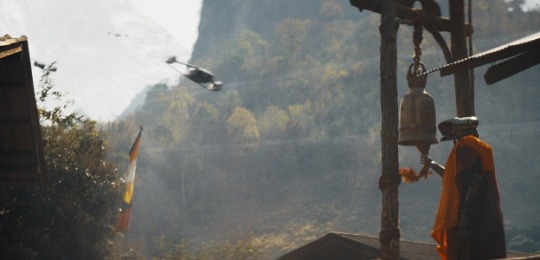
So further along in the film, what do we see?
Further on the journey, we have Joshua and now Alfie. The best way to say it is that Joshua infiltrated the AI village with the insurgents and guerrillas. Basically they’ve abducted the child. As this is happening, it seems that the Americans have also arrived. Essentially these rockets ascend into the air, and they smoke out the whole village and then it all unfolds from there.
What would you list as your cinematic influences for The Creator? What movies should we see as companion pieces?
Since my first film, I put up posters in the edit suite of movies that had inspired the film I was doing. There are some really obvious ones you’d probably predict. But there’s a film called Baraka. The cinematographer from that film went on and directed another film called Samsara, which is one of the greatest movies ever made. Lone Wolf and Cub is a Japanese manga series. There’s a whole bunch of films called Sword of Vengeance. The really obvious ones are Apocalypse Now and Blade Runner. In terms of this film’s dynamic, maybe there’s a little bit of Rain Man [in it]. It’s a journey of someone normal and someone who’s a little bit special. And there’s Paper Moon, with its dynamics.
What was your inspiration behind the robot designs? And talk about working with your costume designer for the entire film.
A lot of the costumes were done by the WETA Workshop in New Zealand. Peter Jackson and ILM [Industrial Light and Magic] did all the visual effects — or a lot of them — plus some by the vendors around the world. We tried to summarize the design and aesthetic of the movie as a bit retro futuristic. Imagine if Apple Mac hadn’t won the tech war and Sony Walkman had. everything has this sort of ’90s/ ‘80s kind of Walkman/Nintendo thing. We looked at all the product designs from that era and riffed off little pieces and tried to put them into the robots. The tricky thing with designing robot heads was to pull from sources. We did a whole pass at one point where we took insect heads and then tried to make it as if that insect had been made by Sony — like the praying mantis — and changed it into product design. Then we took products and tried to turn them into organic looking heads. We took things like film projectors, vacuum cleaners — things like that — and then just messed around. I just kept experimenting; it was like evolution in real life, like DNA getting merged and trying to create something better than the previous thing.
Being a big science fiction director, who are some of the directors and writers that you looked up to and get inspiration from?
There are the obvious people — Steven Spielberg, James Cameron, Ridley Scott. It’s the high benchmark of essentially what we were trying to do. I’m not saying we got anywhere close to achieving it, but the goal of the movie was to try and go back to that style and type of film that we grew up loving, like the film was shot on 1970s anamorphic lenses and things like this. Actually, I hate writing. It’s like doing homework. The worst thing in the world is having to write a screenplay. The only way I can bring myself to do it is to lock myself in somewhere nice. I’m not allowed to leave until I’ve finished. I’ll stay there for like a month or something. I went to Thailand, to the exact place where the beach ended. I didn’t realize I was getting inspired for the movie. I just picked this nice resort, and it was like a recurring theme like in the Maldives and now this beach resort in town. Whilst I was there, a filmmaker friend who was in Vietnam said, “Come over and we’ll just do a little trip.” I went there and you can’t just go around that country and not think of all the imagery from films like Apocalypse Now. Now I can, but I was writing this science fiction film. So everything I was looking at in my mind was like robots, spaceships and things. You’d see Buddhist monks going to temples and I’d picture a robot Buddhist monk. I just spent the whole time going, “Oh my God, what is this movie?” This feels like there was something so appealing about it, this mix of Blade Runner meets Apocalypse Now.
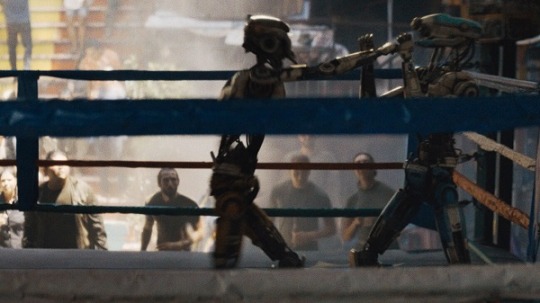
What was the biggest challenge filming this?
I wouldn’t say it was a particular thing; it was more just the duration of it. We started filming in January 2022 and we finished in June. We were there for six months and it was like nonstop 40-degree heat, people were dying every day. it was a dream looking back at it, to get to do that. But there was a point where you wanted to collapse and you felt like, “He’s only done seven days of filming and there’s still all that is still left. The first cut of this movie was five hours long and we had so much great, cool material but everything that’s in this film is all the best stuff. The editing process was basically like a game of Jenga where we would pull things out and see if we missed it or it fell apart. We had it packed by the end through the editors, but we finally got it down to two hours. It’s like the old adage “less is more” most of the time.
What are the highest and best values of humanity that you hope this movie ultimately illustrates?
I hope some sort of empathy for others [is there]. That’s a strong value which is very important. When this film began, I obviously didn’t know AI was going to do what it ended up doing this last year. AI was really in the fairy tale of this story. We want to get rid of people who are different from us. All kinds of fascinating things start to happen while you write that script. You start to think, “Are they real? How would you know and what if you didn’t like what they were doing? Can you turn them off? What if they didn’t want to be turned off?” This sort of stuff started to play out which became as strong as the premise and that’s what I’m most proud of.
Two words for you: Hans Zimmer.
Everyone’s iPhone tells you the last 25 most played tracks or something like that. I looked at [mine] out of curiosity and I think 14 were Hans Zimmer tracks. I was like, “I don’t know how we get composer Han Zimmer, but we have to try.” Joe Walker, editor of Rogue One, assembled the film. He had worked with Hans a lot and was like, “I’ll talk to him.” We ended up in this strange situation where I had to call Hans whilst in the middle of nowhere; we were going to meet the head of the military in Thailand to get permission to film the Black Hawks for one of those sequences. It was this massive deal meeting that took months and months to organize. It happened to be the same moment that Hans was available to do a Zoom. We had to pull off the road. It was like a hotel in the middle of nowhere and they had Wi-Fi. I go in there and get Hans and the worst thing in the world is that they said you’ve got to leave in 30 minutes. You can’t stay because the whole military is waiting for us over here. I was looking at this clock and Hans started telling his anecdotes about The Dark Knight and Terrence Malick. All my life I’ve wanted to talk to him about these films and I have to go,” I’m really sorry, Hans, I have to leave now.” It was so against every bone in my body to come away from that.
Talk about working with Oscar-winning cinematographer Greig Fraser.
I obviously worked with Greig on Rogue One. Greig had to make this work as well. We were totally on the same page and Greig’s very rebellious. and despite how it might look because he’s, you know, doing his big movies. But we’re both during that, like the build up to this film, I got to go around one of these virtual reality studios where they had this poster on the wall as to how you make a movie. it was every part of the process, and I was just looking at it going, “What a strange thing to have. Why are they doing it? Why have they got this poster?” The guy who ran the thing came up to me and went, “Oh, I see you looking at the poster — that’s 100 years old.” When I looked at it, I realized the typography was like 100 years old. We haven’t changed how films are made in 100 years. We still do it the same way. With all these new digital tools and technology, there are other ways to make films. People like Greig and I really want to do things differently because that’s how you make a different type of movie. The process is as important as the screenplay to some extent.
Let’s talk about the opportunity and power of science fiction to drive social commentary and reflection.
I like science fiction because there’s a chance to sneak ideas under the radar. My favorite TV show growing up was The Twilight Zone which was in the ’50s and ’60s. Rod Serling, who wrote a lot of those shows, had said the reason he did science fiction was because he could get out from under the radar of the censors and say things you’re not normally allowed to say out loud. If you start to type and work out a film, and you go, “I want to make a film about this. It’s got to have this social commentary to it”— it will be a rubbish film. If you get attracted to an idea, there’s something primal about it that pulls you in. There’s something that needs to be said about this subject matter but about halfway through making or writing a film is when you start to realize what that thing is. It’s like a child who tells you what they want to be when they grow up. You learn what it is and then you try to help it along. Science fiction does it the best because we all go through our lives with certain beliefs, and they never really get tested. You do everything you’re supposed to do but science fiction says, what if the world had this different thing about it. Would your little idea still work, and you hit against the wall? The thing you used to think was true starts to be false. And you begin to question things. I love that kind of storytelling. I hope our film does a little bit of that.
[For fans of this film or any genre film, go to Big Apple Comic Con‘s Christmas Con, taking place in the New Yorker Hotel this December 16th, 2023, www.BigAppleCC.com. There are many opportunities to steep yourself in sci-fi and other graphic story collectibles. Get posters and other collateral available from The Creator and many others as your stocking stuffers.]
Copyright ©2023 PopEntertainment.com. All rights reserved. Posted: September 28, 2023.
Photos © 2023. Courtesy of 20th Century Studios. All rights reserved.
youtube
8 notes
·
View notes
Text
E.T. The Extra Terrestrial
By Jensen Boles
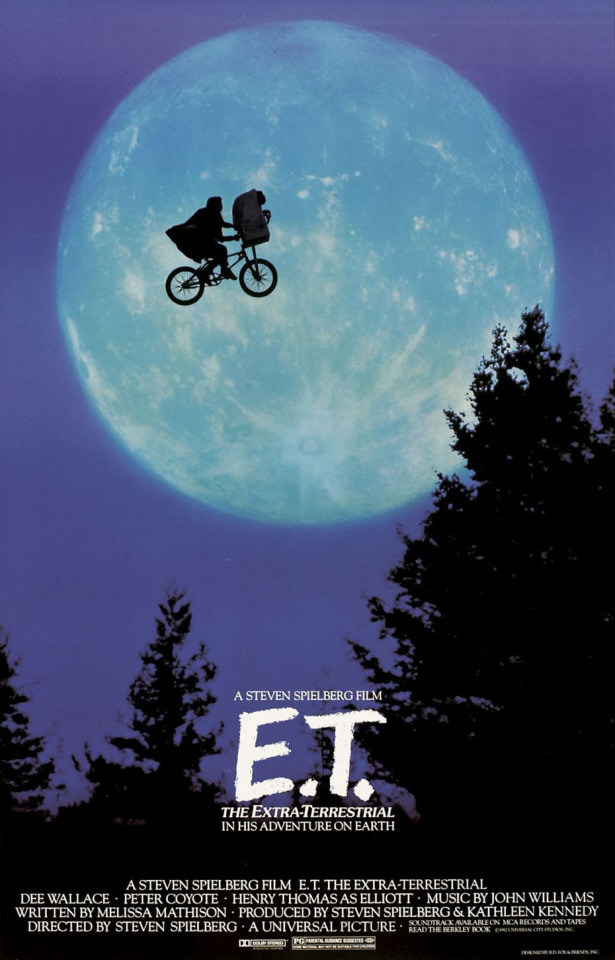
E.T The Extra Terrestrial film poster.
Directed by legendary filmmaker Steven Spielberg, E.T. The Extra Terrestrial is regarded as an all time classic in the history of cinema. Spielberg was also known for his other classic films he directed such as Jaws, Jurassic Park, Schindler's List, Close Encounters: of the Third Kind and many more. The film, E.T. was released on June 11th, 1982 and stars the likes of Henry Thomas, Drew Barrymore, Robert MacNaughton, Dee Wallace, Peter Coyote, and C. Thomas Howell.
youtube
Meeting E.T. for the first time clip.
The story of E.T. consists of an alien from outer space who accidentally gets left behind on Earth and a kid named Elliot (Henry Thomas) befriends the alien and brings him to his suburban California house. The alien, who goes by E.T., is then introduced to Elliot's brother, Michael (Robert MacNaughton), as well as his little sister, Gertie (Drew Barrymore). The kids try to keep E.T.'s existence a secret before E.T. succumbs to an illness which results in the government intervening, turning it into a stressful situation for E.T. and Elliot. However, things go right in the end as E.T.'s people come back for him and E.T. returns home safely. The film is also known for its story about an aliens who come to earth, the plot has been done before in a similar fashion for the film Close Encounters of the Third Kind which was also directed by Steven Spielberg as well as being a influence for other films to come such as Lilo and Stitch and many more.
The film was so influential and is regarded as a classic by many fans and critics alike. Roger Ebert once said "This movie made my heart glad. It is filled with innocence, hope, and good cheer. It is also wickedly funny and exciting as hell. "E.T. The Extra-Terrestrial" is a movie like "The Wizard of Oz," that you can grow up with and grow old with, and it won't let you down." Roger Ebert is saying that this movie is timeless and no matter how old you are or how many times you see it, the film will always be a classic. Phillip French from The Guardian even said "Spielberg clearly loves E.T. as much as the kids do, but he stops short of reverence. E.T. is indeed a marvelously funny creature and a credit to his galaxy." This quote indicates that E.T. will always be regarded as a classic film.
youtube
E.T. and Elliot Across the moon clip.
When it comes to the film's style, E.T. The Extra Terrestrial uses different techniques such as different practical effects to create a mysterious atmosphere, especially when it comes to the shot of Eliot and E.T. flying across the moon. This scene is so iconic and has also been referenced and spoofed in different forms of media.
For the film’s aspects of global cultures, I see how the film's world is reminiscent of a 1980's American suburban lifestyle. I think it makes sense since the film was released in 1982 and takes place in California.
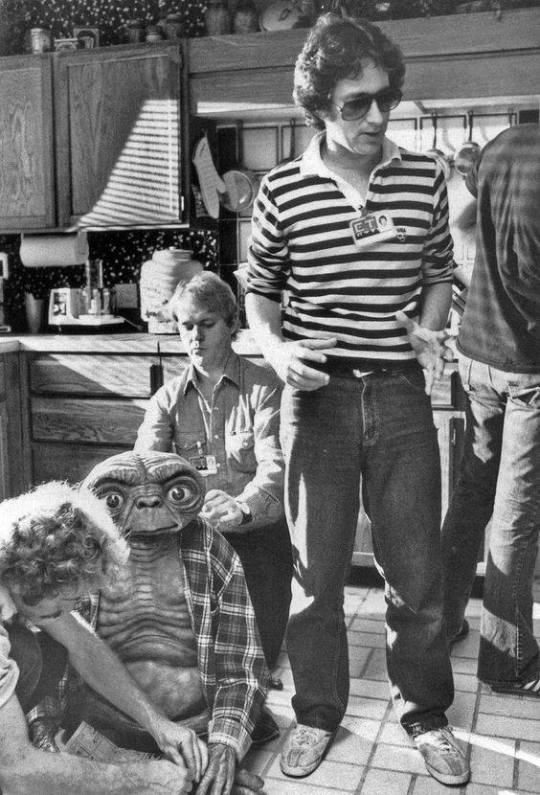
Behind the scenes look at E.T The Extra Terrestrial.
I believe this film is considered conventional because of the special effects and puppetry looking impressive for 1982 standards. It is also conventional because of the plot and how it's easy to follow along with being distributed by Universal studios which is a large company. With that said, the film made $11,911,430 for its opening weekend with a production budget of only $10,500,000. It also made $439,454,989 domestically and $357,852,418 internationally, making a total of $797,307,407 worldwide. However, the film does contain a few unconventional aspects such as the language the kids use when the adults aren't around, as well as having the alien act unusual while stranded on Earth. Despite a few unconventional aspects, I still consider this film to be conventional because of the amazing special effects as well as being directed by Steven Spielberg.
Since this film was released in the year of 1982, there have been many events happening globally that year. But the two that I'll be discussing would be the San Francisco 49ers winning their first Super Bowl by defeating the Cincinnati Bengals, 26-21. As well as Michael Jackson releasing his sixth studio album entitled Thriller. I believe these events that happened do have a global impact because the 49ers cemented their NFL dynasty and would later go on to win 5 Super Bowl's. Michael Jackson was a popular music star during the 1980's and influenced a bunch of later musical artists.
5 notes
·
View notes
Text
Film Class Rankings
Finally, after 4.5 months of my film class, it is over and the rankings are out! (Long list ahead)
First, my class's ranking:
Top Gun: Maverick (2022), Joseph Kosinski
Inception (2010), Christopher Nolan
Jurassic Park (1993), Steven Spielberg
Black Panther (2018), Ryan Coogler
Jaws (1975), Steven Spielberg
The Killing (1956), Stanley Kubrick
The Third Man (1949), Carol Reed
Arrival (2016), Denis Villeneuve
Rear Window (1954), Alfred Hitchcock
High Noon (1952), Fred Zinnemann
All The President's Men (1976), Alan J. Pakula
Vertigo (1958), Alfred Hitchcock
Casablanca (1942), Michael Curtiz
2001: A Space Odyssey (1968), Stanley Kubrick
Maltese Falcon (1941), John Huston
Citizen Kane (1941), Orson Welles
I personally did not care for the majority of their placements... after some deliberation I decided to place the movies based on my own personal enjoyment of them rather than how good of films they were.
I sorted them into 3 categories:
Liked: Black Panther, 3rd Man, Arrival, Rear Window, All the President's Men
Eh: High Noon, Space Odyssey, Maltese Falcon, Citizen Kane, Top Gun, Vertigo, Jaws
No: Jurassic Park, inception, the killing, casablanca
And here was the final ranking:
Arrival (2016), Denis Villeneuve
All The President's Men (1976), Alan J. Pakula
Black Panther (2018), Ryan Coogler
Rear Window (1954), Alfred Hitchcock
The Third Man (1949), Carol Reed
2001: A Space Odyssey (1968), Stanley Kubrick
Top Gun: Maverick (2022) , Joseph Kosinski
High Noon (1952), Fred Zinnemann
Jaws (1975), Steven Spielberg
Citizen Kane (1941), Orson Welles
Maltese Falcon (1941), John Huston
Vertigo (1958), Alfred Hitchcock
Inception (2010), Christopher Nolan
Casablanca (1942), Michael Curtiz
Jurassic Park (1993), Steven Spielberg
The Killing (1956), Stanley Kubrick
1-2 I was deciding between All the Prez and Arrival for the top spot, but even though I liked Prez's plot better, I think that Arrival was good in pretty much every category and had the best parts of Inception and Jurassic Park, with the cool shots of Vertigo. It's also the only one with a female mc? What's with that
3. Black panther's a good movie and has nice visuals, but I've already seen it before and it's the kind of movie I'd probably only want to watch once.
4. I liked the concept, and it was very colorful. Character wise it's not the greatest, but I still maintain that Rear Window with the characters of Saw would be the greatest thing ever... Also I liked Grace Kelly's outfits. She had some great (and a few less great) styles.
5. 3rd man. I think the score could've been better, but I liked the characters, plot, and setting. Also it's the only one on the list directed by a woman? How'd I not notice that. It's also one of the few with an interesting female main character so.. go figure.
6. Plot and character wise... I didn't really know what was going on at the end, and the other parts weren't super interesting. It was super beautiful though! I felt like I was watching an art piece or one of those no word heavy detailed picture books. Music not bad, and points for managing to look movie poster ready in the majority of scenes
7. Top gun was pretty good. I haven't seen the original, but it kind of made me think of those family spy movies or suicide squad, if they were members of the military and not utterly despised. I was wondering if Iceman had a thing for him, and then found out that people had been thinking similar things in the first movie too. So props for consistency. It's hard to make good sequels.
8. I don't care for Westerns, but I actually liked this alright. Also it's short. Space Odyssey was so long that everyone was snoozing at parts, but this one was just a drama about a guy and his lackluster relationships. Also ngl Gary Cooper in that movie kind of looked like the police chief from the Arcane series, so that made my day.
9. Not much for sharks or the ocean, but it wasn't bad. They got the obligatory team bonding and tragic backstories, random kids whose purpose is only to be cute/innocent and/or a martyr, the mysterious crazy old guy, and the good old state of Massachusetts. I probably like it more than I would Moby Dick if I ever got around to reading it. Would consider watching again.
10. Citizen Kane wasn't bad to look at, and plot was pretty straightforward. I guess it's sort of funny if not sad to hear all this guy's associates rag on him after death, but I thought it was interesting. The 2nd wife was my favorite character.
11. Best character was the secretary. Kind of sad how a lot of these movies are clearly written by people who don't like/understand women, but they still often end up being the best characters. Anyway the movie was pretty dull, but it really turned around in the last 20 or so minutes. Went from being 30 to 100. It also had one of the greatest movie endings I've seen, even outside of this class, that completely turned around my opinion of it.
12. I really wanted to like this movie. It had nice visuals, I liked his ex, and the plot seemed interesting. And then it turned scifi and weird, and then just went kind of gross and disturbing. And then it had this random goofy bit and the worst transition ever, to finally making sense and being interesting again. And then it had a terrible ending and I was not pleased. I give it points for a lot of things- great visual, interesting story, and it created some interesting special effects. The plot kept me guessing and I seriously had bo idea what was actually going on into the movie slapped me in the face with the answer.
13. I didn't like this movie. I like Elliot Page, but I didn't think the acting was that good (DiCaprio was ok, and Saito was fine). The plot was confusing, keeping track of characters was difficult, and I didn't really care about any of them (with the exception of Saito). I pretty much understood everything by the end (honestly, a lot of the dialogue I just couldn't hear because the teacher wouldn't put on subtitles, so that could be a factor). I also didn't know most of the characters' names throughout the movie so I had to give them nicknames.
14. Visuals were eh, the music was fine when they weren't playing that BLASTED SONG, and I hated the love interest. She has the perfect man who she wants to break the heart of and hurt the war effort, just so she can get with her ex that she didn't even know all that well? More than that, she brought out the worst in him. Love ought to make people better, or happier, or something. Hers just made him act scummy. I also don't know if he really just left his friend/employee? To run off into the sunset with a nazi? Speaking of bad endings, what was that? I'm all for gay subtext but what exactly were they going for. Plus Louis was the most interesting character to watch, and again, he's a nazi. I just found it a little odd. (I also liked Victor but they barely gave him any screentime. Did him super dirty)
15. I don't like dinosaurs. I really don't like people stranded in the jungle and eaten by dinosaurs either. It's a personal taste I guess. Characters were eh.
16. I actually was having trouble watching. I was bored for most of it, the characters didn't really interest me (the wife, Sheryl? Did a little), and it wasn't that interesting visually. I feel like it's a more boring black and white Pulp Fiction, another movie I didn't care for. No likeable characters. Anywhere. But I do have to give it credit for having an outright gay character instead of thinly veiled like some of the others.
At the end we were supposed to give suggestions for other films to watch in the class (I had to come back later and do it cause I misunderstood the directions 😅), so here were these in no particular order.
Missing (2023), Nicholas D. Johnson + Will Merrick
Pleasantville (1998), Gary Ross
Clue (1985), Jonathan Lynn
Kill Bill (either one, I've only seen the 2nd) (2003-2004), Quentin Tarantino
Enchanted (2007), Kevin Lima
I figured it'd be a good addition for a film class since it's mostly shown through screens (camera, phone, etc). It's not the first to do this, but it's probably the best.
Movie's eh, but I like the color and black&white mixing, and its importance to the plot
it has 3 endings, and is based on a board game. It's also a cult classic, which I think makes it historic/relevant enough to discuss
We didn't watch a single martial arts movie, and this one is a mix of a few different genres. It's bright and flashy, it's well loved, and I'm pretty sure we skipped over 2000s movies anyway.
Cartoon and animation. Also it's a good movie.
Good job getting to the end😅 These were just my opinions of the movies, so sorry if any offended you. I like discussions though, so feel free to comment or disagree with any of these.
3 notes
·
View notes